



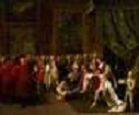
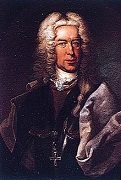

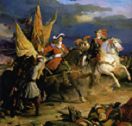


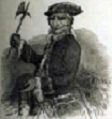

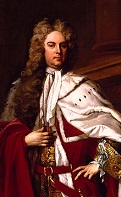
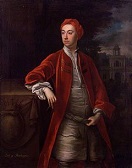






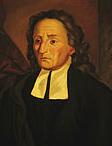

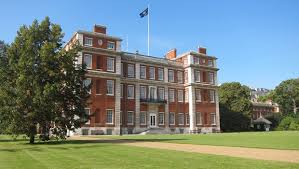

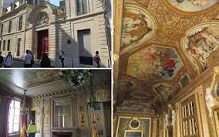
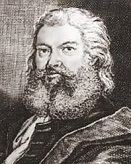
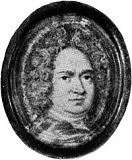
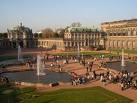

1710 Pop. of the Am. colonies: 300K. In this decade French Canadian voyageurs began exploring the rivers of W Canada by canoe, establishing the fur trading business (until 1870); too bad, they carry TB, which they spread go the Indians, where it lies dormant until the late 1800s, causing a delayed epidemic. On Feb. 27-Mar. 21 British Tory House MP and Anglican clergyman Henry Sacheverell (1674-1724) is impeached for his sermons condemning the principles of the 1688 Rev. and slamming Sidney Godolphin under the alias "Volpone", causing the Tories to proclaim him a martyr, and his light sentence of three years' suspension to be hailed as a Tory V, allowing the queen (influenced by Lady Abigail Masham) on Aug. 7 to dismiss Sidney Godolphin (who had been proppping the Whigs up) from her cabinet and pack it with Tories; John Poulett, 1st Earl Poulett (1663-1743) succeeds Sidney Godolphin as chief minister of the British cabinet (until 1711); an election gives the Tories a majority; Henry St. John becomes British foreign secy., sharing the leadership of the Tory Party with chancellor of the exchequer Robert Hartley; Marlborough's Tory enemies work to secure his dismissal and begin negotiations to end the war with France, while thinking up laws making life difficult for Whigs (Property Qualification Act, Occasional Conformity Act, Schism Act). On Mar. 13 the Buke Shohatto Laws for the Japanese nobility are promulgated by Shogun Iyenobu, starting with the soundbyte: "The Way of Literature and Arms must be constantly pursued, human relations be clearly distinguished, and manners be correct". On July 27 the Battle of Almenar in the Almenar Hills near Balaguer, Catalonia is a V for the 23K-26K-man allied (pro-Archduke Charles) army, consisting of 18K men under Austrian Gen. Guido Wald Rudiger, Count of Starhemberg (1657-1737) (cousin of Ernst Rudiger von Starhemberg), and 5K men under British Gen. James Stanhope, 1st Earl Stanhope (1673-1721) over a 22K-man Spanish-French army under Spanish gen. Francisco Castillo Fajardo, 2nd Marquis de Villadarias (1642-1716), who is fired and replaced by Alexandre Maitre, Marquis de Bay (1650-1715); on Aug. 15-20 the allies score another V over the regrouped 20K-man Spanish-French force at the Battle of Saragossa between the Ebro River and the Torrero Heights, scattering them, killing or wounding 7K-10K, and and taking 5K POWs, with only 1.5K casualties on the allied side; Philip V barely escapes disguised as an enlisted soldier with the help of a miller; on Aug. 21 the allies capture Saragossa, and Archduke Charles triumphantly enters it; after deciding not to pursue the 18K Spanish suvivors to Tudela and recapture Valencia to secure the Spanish-French border against French invasion, the allies head for Madrid, and on Sept. 9 Philip V abandons it for Valladolid; on Sept. 28 Archduke Charles triumphantly enters it (2nd occupation), commenting "This city is a desert"; too bad, after losing 2K in action and many more through disease and skirmishes with guerrillas, the allied army is incapable of occupying the country, and after a Portuguese army advancing to their aid is scared off by a French force, they evacuate Madrid on Dec. 6, and begin a retreat to Catalonia, split into two forces, the main body of 12K men under Starhemberg and a rearguard of 5K men under Lord Stanhope; meanwhile French gen. Louis Joseph de Bourbon, 3rd Duc de Vendome (1654-1712) and an Irish brigade join Philip V's cause, forming a 24K-man army, and they race at record speed to intercept them, and on Dec. 8-9 they ambush and defeat the British rearguard under Lord Stanhope at the Battle of Brihuega, the game Brits fighting until they run out of gunpowder then continuing with bayonets until Stanhope calls it quits, and is taken POW along with almost the entire army, while a remnant of Brits make it to Barcelona; meanwhile Starhemberg races to their aid, and meets Vendome on Dec. 10 at the vicious Battle of Villa Viciosa (Villaviciosa de Tajuña) near Madrid, which is a V for Vendome, who takes 2K POWs and 22 guns, followed by Starhemberg's retreat to Barcelona, which he reaches on Jan. 6 after his army is reduced to 6K-7K, during which a French army under Gen. Noailles occupies Gerona on Dec. 15, securing Philip V's grip on Spain and causing the Hapsburg alliance in Spain to collapse. On Oct. 2 after petitioning Queen Anne for a military expedition to recapture the last colony of Nova Scotia, former Va. gov. (1699-1705) Francis Nicholson (1655-1728) attacks and captures Port Royal, capital of Acadia (founded 1605), followed by all of Acadia, turning it back into the British province of Novia Scotia and renaming the town Annapolis Royal; the pesky French Acadian pop. is dealt with in 1755; next year Nicholson triumphantly returns to England, taking five Irotoys, er, Iroquois chiefs, and petitions Queen Anne for another expedition to capture New France, which embarks next year, but doesn't turn out so well. After Charles XII of Sweden puts the sultan up to it, the Fourth Russo-Turkish War begins (ends 1711); Sweden declares war on Russia (ends 1711). Charles Talbot, 1st Duke of Shrewsbury (1660-1718), who goes way back to the days of being on the committee of seven who invited William III and Mary II to come over, then went Jacobite but covered it up and retired to private life in 1700, telling Lord Somers he "would sooner bind him to a cobbler than a courtier, a hangman than a statesman", switches from Whig to Tory and is appointed by the queen as lord chamberlain, with his wife appointed lady of the bedchamber, going on to jiggle himself into a position to shrewsburily determine the succession on the queen's death in 1714. The Post Office Act begins an Am. postal service under the control of London effective June 1, 1711, whose postmaster is authorized to name a deputy in charge of the colonies; Benjamin Franklin is deputy from 1753-1774. The Irish Parliament sets up the Linen Board to encourage the linen industry. The French assume control of Mauritius (formerly part of the Dutch East Indies) (until 1810), and rename it Ile de France. Ang Em becomes king of Cambodia for the 2nd time (until 1722). Four Mohawks agree to accompany English agents to London, where they meet with Queen Anne and have their portraits painted (the first celebrity Indians in Europe since Pocahontas and her party); one of them is Chief Hendrick (d. 1755), uncle of Chief Joseph Brant (1742-1807), a staunch British ally until his death. Robert Walpole (1676-1745) becomes treasurer of the British Navy - you sunk my battleship? The English Parliament passes the New Churches in London and Westminster Act of 1710, creating the Commission for Building Fifty New Churches to build up to 50 "Queen Anne Churches" in the London area, funded by a duty on coal coming into London like with St. Paul's Cathedral, most designed by architects Nicholas Hawksmoor, Thomas Archer, James Gibbs, and John James, ending with 12 by 1733. An outbreak of rinderpest (cattle plague) begins in the Venetian Repub. (ends 1711), and chief physician Bernardino Ramazzini shocks the crowd by denouncing astrological or astral explanations in favor of scientific ones. Palatines and Swiss colonists settle New Bern, N.C. The British settle Beaufort, S.C., replacing prior flags from Spain, France and Scotland. The Christian-run city council of the Alsatian Jewish haven of Hagenau issues an edict prohibiting foreign Jews from being sheltered, and prohibiting them from transacting business on Sunday and Christian holy days. Berlin Charite (Hospital) in Germany is founded. The Meissen porcelain works in Saxony, famous for Dresden china are founded by Johann Friedrich Bottiger, who moved from Dresden. Magdeburg, Germany-born George Frideric (Georg Friedrich) Handel (1685-1759) returns from Italy after visiting Anna Maria Luisa de' Medici, and is appointed kappelmeister to the elector prince George of Hanover (later George I of Britain); he makes a visit to London, where in 14 days he completes the opera Rinaldo, which debuts at the Queen's Theatre causing him to settle there permanently in 1712 with Queen Anne giving him £200 a year, after which rich Richard Boyle, 3rd Earl of Burlington (1694-1753), and James Brydges, 1st Duke of Chandos (1673-1744) become patrons, both becoming known as "Apollo of the Arts". The Academy of Ancient Music (Academy of Vocal Music until 1726) is founded in London, with German-born composer Johann Christoph Pepusch (1667-1752) as dir. #1 (until 1752). Isaac Newton's successor as Lucasian prof. of mathematics (since 1703) William Whiston (1667-1752) is expelled from Cambridge U. for heresy for pub. his anti-Trinitarian (Arian) views, and moves to London, becoming a kind of English Enlightenment hippie; Newton gets pissed off because he's an Arian too but keeps it secret, and prevents him from being invited to become a member of the Royal Society. Madame de Lambert (1647-1733) sets up a bureau d'esprit (salon) in the Hotel de Nevers in Paris, which becomes the first one to be used for serious philosophical discussions. After becoming an actor for Thomas Betterton's United Co. at Drury Lane Theatre in 1690, Bloomsbury, London-born Colley (OE "dark-haired") Cibber (1671-1757) rises to mgr. (first British actor-mgr.), going on to write 25+ crummy plays for his co., which are criticized as a "miserable mutilation... of crucified Moliere and hapless Shakespeare". The Sun Fire Office is founded in London to insure sugar refiners. The lit. periodical The Examiner begins pub. in England. Scipione Maffei, Apostolo Zeno, his brother Pier Caterino Zeno, and Antonio Vallisneri found Giornale de'letterati d'Italia (Journal of Italian Lit.). The version of the lewd comedy character Hans Wurst by Joseph Anton Stranitzky (1676-1726) first appears in the suburban theaters of Vienna. Architecture: Sir Christopher Wren begins Marlborough House in Westminster, London for Sarah Churchill, Duchess of Marlborough, favorite of Queen Anne (finished in 1711); in the 1980s it becomes the HQ of the Commonwealth of Nations and the Commonwealth Secretariat. French architect Germain Boffrand (1667-1754) begins the Hotel Amelot in Paris (finished 1713), which features an oval forecourt - a lot of what goes on there? As part of the rebuilding of Dresden after the 1685 fire, German Baroque sculptor Balthasar Permoser (1651-1732) and German architect Matthaus Daniel Poppelmann (Pöppelmann) (1662-1736) design the Zwinger Palace in Dresden for Augustus II the Strong of Saxony (finished 1728), featuring the Nymphenbad Fountain and the Wallpavilion, with sculptures by Permoser. Inventions: Jacob Christoph Le Blon (1667-1741) of Germany invents 3-color printing. Science: Per (Pehr) Elvius the Elder of Sweden becomes the first to assign the values 0 degrees and 100 degrees to the boiling and melting points of water. English astronomer Edmund Halley (1656-1742) discovers that the position of the "fixed" night stars change over time, hence the Earth must move around the Sun. Francois Xavier Bon de Saint Hilaire of France produces the first commercial saffron-colored silk from golden orb spiders in Madagascar, making an entire suit of clothes for Louis XIV. Nonfiction: Henri Arnaud (1641-1721), Histoire de la Glorieuse Rentree des Vaudois dans Leurs Vallees. Pierre Bayle, Dictionary (English tr.). George Berkeley (1685-1753), A Treatise Concerning the Principles of Human Knowledge; attempts to prove Immaterialism AKA Subjective Idealism, which holds that the outside world is composed solely of ideas; "Ideas can only resemble ideas"; "To be is to be perceived." Richard Bradley (1688-1732), Treatise of Succulent Plants. Cornelius van Bynkershoek (1673-1743), Observationes Juris Romani. Mary Chudleigh (1656-1710), Essays Upon Several Subjects; urges women to not be concerned with wealth, status, interest, or ambition. William King (1663-1712), An Historical Account of the Heathen Gods and Heroes. Theodor Krump, Travels in Abyssinia, 1700-2; by a German cleric-explorer. Gottfried Wilhelm von Leibnitz (1646-1716), Theodicy (Theodicee); coins the term "theodicy" for a system of natural theology that seeks to vindicate divine justice yet allow evil to exist, with the soundbyte "God created the best of all possible worlds", later satirized by oltaire in Candide. Cotton Mather (1663-1728), Essays to Do Good. Rev. John Wise (Mass.), The Churches' Quarrel Espoused; colonials "hate an Arbitrary Power... as they hate the Devil". Giambattista Vico (1668-1744), De Antiquissima Italorum Sapientia, ex Linguae Latinae Originibus Eruenda (On the Most Ancient Wisdom of the Italians, Unearthed from the Origins of the Latin Language); known for the soundbyte "verum esse ipsum factum" (the true itself is fact), meaning that truth is verified through creation or invention and not through observation a la Descartes; "The criterion and rule of the true is to have made it. Accordingly, our clear and distinct idea of the mind cannot be a criterion of the mind itself, still less of other truths. For while the mind perceives itself, it does not make itself." Music: G.F. Handel (1685-1759), Il Trionfo del Tempo (oratorio) (Rome). Reinhard Keiser (1674-1739), Der Durch den Fall des Grossen Pompejus Erhohete Julius Caesar (opera) (Hamburg); Der Hochmutige, Gesturzte und Wieder Erhabene Croesus (opera) (Hamburg). Plays: William Congreve (1670-1729), Collected Works (3 vols.). Alexander Pope (1688-1744), The Pastorals (debut); pub. in "Poetical Miscellanies" by Jacob Tonson, causing Pope to become a lit. celeb. Novels: Henry Carey (1687-1743), Records of Love; serialized romance for female readers. Births: Italian "Stabat Mater" composer-violinist-organist Giovanni Battista Pergolesi (Draghi) (d. 1736) on Jan. 4 in Jesi, Ancona, Marche; parents are from Pergola, Marche. French king (1715-74) Louis XV (the Well-Beloved) (d. 1774) on Feb. 15 in Versailles; son of Duke Louis de Bourgogne (1682-1712) and Marie-Adelaide of Savoy (1685-1712); great-grandson of Louis XIV. Am. Rev. War. gen. David Wooster (d. 1777) on Mar. 2 in Stratford, Conn. English "Rule, Britannia", "God Save the King", "A-Hunting We Will Go" composer (Roman Catholic) (Freemason) Thomas Augustine Arne (d. 1778) on Mar. 12 in Covent Garden, London; Anglican father, Roman Catholic mother; educated at Eton College. Italian castrato opera singer Caffarelli (Gaetano Majorano) (d. 1783) on Apr. 12 in Bitonto; pupil of Nicola Porpora; likes singing so much that he asks to be castrated? Am. explorer Jonathan Carver (d. 1780) on Apr. 13 in Weymouth, Mass.; grows up in Canterbury, Conn. French-Belgian-Spanish ballet dancer Marie Anne de Cupis de Camargo (AKA La Camargo) (d. 1770) on Apr. 15 in Brussels; of Spanish descent. Scottish astronomer James Ferguson (d. 1776) on Apr. 25 near Rothiemay, Banffshire; self-educated; emigrates to England in 1743. Scottish "An Inquiry into the Human Mind on Principles of Common Sense" philosopher ("Hume's earliest and fiercest critic") Thomas Reid (d. 1796) on Apr. 26 in Aberdeen, Scotland; educated at the U. of Aberdeen. Am. Rev. patriot Richard Bland II (d. 1776) on May 6 in Williamsburg, Va.; cousin of Thomas Jefferson. Swedish king (1751-71) Adolf Fredrik (Adolph Frederick) (Adolphus Frederick) I (d. 1771) on May 14 in Gottorp; son of Duke Christian Augustus (1673-1726) of Schleswig-Holstein and Albertina Frederica of Baden-Durlach (1682-1755); father of Gustav III (1746-92). Am. Rev. patriot and Conn. gov. (1769-84) French Rococo sculptor Francois Gaspard Adam (d. 1761) on May 23 in Nancy; son of Jacob-Sigisbert Adam; brother of Lambert-Sigisberg Adam the Elder (1700-59), Nicolas-Sebastian Adam the Younger (le Jeune) (1705-78), and Anne Adam. German Goethe's father Johann Caspar Goethe (d. 1782) on July 29 in Frankfurt am Main; husband (1748-) of Catharina Elisabeth Goethe (1731-82); father of Johann Wolfgang von Goethe (1749-1832). English Simpson's Rule mathematician Thomas Simpson (d. 1761) on Aug. 20 in Market Bosworth, Leicestershire. Am. Conn. gov. (1769-84) Jonathan Trumbull Sr. (d. 1785) on Oct. 12 in Lebanon, Conn.; only colonial gov. to support the Am. Rev. cause; George Washington calls him "Brother Jonathan", causing the term to refer to the entire U.S. English "Butler's Lives" Roman Catholic priest and hagiographer Father Alban Butler (d. 1773) on Oct. 13 in Appletree, Northamptonshire; educated in Douai, France. French dramatist (creator of the comic opera) Charles Simon Favart (d. 1792) on Nov. 13 in Paris; educated at Louis-le-Grand College; stage mgr. of the Opera-Comique; husband of Marie Justine Benoite Duronceray (1727-72). German "Twelve Polonaises" Rococo organist-composer Wilhelm Friedemann Bach (d. 1784) on Nov. 22 in Weimar; eldest son of Johann Sebastian Bach (1685-1750). English writer bishop Robert Lowth (d. 1787) on Nov. 27 in Hampshire; educated at New College, Oxford U. English poet John Hammond (d. 1742). Am. Rev. War gen. Josiah Quincy Sr. (d. 1784); father of atty. Josiah Quincy Jr. (1744-75); descendant of Edmund Quincy, who emigrated to Mass. in 1633; educated at Harvard U.; friend of Benjamin Franklin. English military physician Sir Clifton Wintringham, 1st Baronet (d. 1794); educated at Trinity College, Cambridge U.; knighted in 1762; created baronet in 1774. Deaths: English actor-dramatist Thomas Betterton (b. 1635) on Apr. 28 in London. French explorer Daniel Greysolon, Sieur Duluth (b. 1636). French explorer Pierre-Esprit Radisson (b. 1636) in London, England. Italian composer Bernardo Pasquini (b. 1637) on Nov. 21. English-born Am. writer Mary Rowlandson (b. 1637) in Mass. French writer-historian Jean Donneau de Vise (b. 1638) on July 8. German astronomer Gottfried Kirch (b. 1639) on July 25. French archbishop Charles-Maurice le Tellier (b. 1642) in Reims. Danish astronomer Olaf Roemer (b. 1644). French mistress of Louis XIV (1661-7) Louise de La Valliere (b. 1644) on June 7 in Paris. Dutch dramatist Lucas Rotgans (b. 1654). English writer Mary Lee (b. 1656), Lady Chudleigh. Austrian noblewoman (sister of the wife of HRE Joseph I) Charlotte Felicitas (b. 1671). Japanese emperor #113 (1687-1709) Higashiyama (b. 1675) on Jan. 16 (smallpox).
1711- The Take Tattler Addison Steele Pope Year?









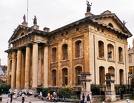
1711 Between this year and 1894 Istanbul (Constantinople) suffers 66 earthquakes. On Jan. 14 (Tevet 24) the Jewish ghetto in Frankfurt, Germany burns down; next fire 1721. On Feb. 21 after systematically getting contracted by the Austrians, Hungarian leader Francis II Rakoczy flees to Poland, and on Apr. 30 new Hungarian CIC Sandor Karolyi quickly signs the Peace (Treaty) of Szatmar (Szatmár), ending the Kuruc Rebellion (begun 1671), with the 12K rebels laying down arms and taking an oath of allegiance on May 1 in the fields of Majteny, Szatmar; meanwhile Francis II Rakoczy is offered the crown of Poland by Peter I of Russia twice, but turns it down, living in Danzig under the alias Count of Saros, then travels to England, is snubbed by Queen Anne, then tries France, is snubbed by Louis XIV, and ends up moving to the Ottoman Empire after Louis XIV's death in 1715. Feel like making love to whom? On Mar. 1 Wiltshire-born Joseph Addison (1672-1719) and Dublin-born Sir Richard Steele (1672-1729), who met while attending Charterhouse School in Surrey begin pub. the journal The Spectator which lasts for 555 daily issues (until Dec. 6, 1712); through its fictional char. Sir Roger de Coverly it becomes the moral conscience of England. On Apr. 14 Louis XIV's eldest son Grand Dauphin Louis (b. 1661) dies of smallpox, losing his chance to become a king, leaving a son who becomes Philip V of Spain, fulfilling the prophecy that he would be "son of a king, father of a king, but never a king". On Apr. 17 young whippersnapper HRE (since 1705) Joseph I (b. 1678) dies in Vienna of smallpox, and on Oct. 20 is succeeded as king of Bohemia and Hungary and HRE by his brother Charles VI (1685-1740) (until Oct. 20, 1740), husband of Elisabeth Christine of Brunswick-Wolfenbuttel (1691-1750) (future mother of Maria Theresa in 1717), becoming the last HRE of the direct Hapsburg line; Charles leaves Spain for the time being, while continuing to claim the throne of Spain, inheriting all of the Austrian possessions, freaking out the other powers with the realization that if he gains the Spanish inheritance too the Hapsburgs would be back in their full hog-jawed power; all this puts Louis XIV and his grandson Philip V in the driver's seat. Sarah Churchill (1660-1744) falls from favor with Queen Anne, and her husband John Churchill, 1st duke of Marlborough is charged with embezzlement and dismissed as CIC of the British armies, living in Holland until 1714; James Butler, 2nd duke of Ormonde replaces him as CIC (until 1714); a Tory backer replaces her in the queen's bedchamber, whispering sweet nothings in her ear scripted by a Tory leader. On May 1 the Peace of Szathmar is signed by HRE Charles VI, guaranteeing the Hungarian constitution in return for recognizing him. On July 18 after Peter I the Great leads the ill-advised Pruth (Prut) River Campaign, invading Moldavia with the aid of brainy Moldavian prince (since 1710) Dimitrie (Demetrius) Cantemir (1673-1723), and ends up surrounded by the Turks on the Pruth River and receiving a butt-kicking, it's curtain time until his mistress Catherine I gathers her jewels plus every other woman's she can find and uses them to bribe grand vizier Baltaji Mehmet Pasha into allowing a retreat, saving his butt bigime; if the Turks had captured Peter I they might have kept Russia down permanently, becoming a great historical what-if; on July 21 the Treaty of Pruth ends the Third Russo-Turkish War (begun 1710), and returns the Black Sea port of Azov to Turkey; Cantemir flees to exile in Russia, becoming prince of Russia and later prince of the HRE, going on to become one of Europe's big brains, (11 languages), doing researches on everything and writing volumes of ambrosia, etc. etc.; the Ottoman govt. of Ahmed III establishes the Phanariot System, ruling Moldavia and Walachia through hospodars ("lords"), who are usually Greeks from Constantinople; Romanian boyars (nobles) begin selling out and allying themselves with the Greeks, and Greek becomes the official language; the big D causes Russia to pass its first budget, tempting Peter I to go after Sweden's province (since 1157) of Finland. On July 30 a large British force of 7.5K troops and marines in nine ships under Adm. Sir Hovenden Walker (1666-1728), together with British colonists under mediocre Maj.-Gen. Sir John "Jack" Hill (-1735) leave Boston to attack Quebec City, capital of New France; too bad, on Aug. 18 as they enter the St. Lawrence River a storm hits, and after sheltering in Gaspe Bay they make the mistake of leaving during a lull on Aug. 22 and ending up in a bigger storm, which sinks seven transport ships, killing 740 of 1,390 troops plus 150 sailors, after which the expedition is abandoned. The French capture Rio de Janeiro from the Portuguese. The Jesuits are banned from entering the Minas Gerais highland region of SE Brazil. The Tuscarora War breaks out in N.C. between settlers and Iroquoian Tuscarora Indians after the latter massacre 200 settlers (ends 1713). Earl Robert Harley of Oxford succeeds Earl Poulett as chief minister of the British cabinet (until 1714). The French dauphin dies, and within a year the duke of Burgundy (his heir), the duchess, and their eldest son also die. To make the majority in the British House of Lords the same party as in the House of Commons, 11 new Tory peers are created, establishing the primacy of the Commons. The Occasional Conformity Bill (Toleration Act) is passed in England (until 1719), stopping Dissenters from technically satisfying the Test Act by taking Anglican communion once and otherwise attending their own nonconformist "chapel". To get the Treaty of Utrecht through Parliament, Queen Anne I gets the Qualification Act passed, establishing a landed property qualification for all MPs in a reactionary attempt to exclude upwardly-mobile merchants, financiers and industrialists, which are coming on strong with the new economy after the Glorious Rev., improved banking, and the lessening nat. debt; it is repealed in 1866 after lax enforcement. Whig Navy treasurer Robert Walpole is tried by the Tory House of Commons on trumped-up charges of "breach of trust and notorious corruption", and sent to the Tower next Jan. 17. Turkish Janissary Ahmed Karamanli (1686-1745) kills the Ottoman gov. of Tripoli in Libya, and establishes himself as pasha, ending Ottoman control (since 1551) and establishing the Karamanli Dynasty (ends 1835), which pays tribute to the Ottoman sultan while engaging in piracy. The South Sea Co. is organized in England to trade with South Am., and is given a royal monopoly; it is given the asiento obtained from Spain at the close of the Spanish War of Succession, and attracts way too much public capital, causing a stock market crash in 1720, although the co. doesn't fold until the 1850s. The first commercial shipment of coffee beans from the Dutch East India plantations in Java arrives in Amsterdam; it is less than 1K lbs. - like with any drug, start them out with free samples? Britain passes the Newspaper Stamp Act, a stamp duty. A slave market is set up at the foot of Wall St. in New York. Peter the Great stops in Hanover and meets German brain man Gottfried Wilhelm von Leibniz, who founds the Berlin Academy as pres. #1. The Muslim Kong (Wattara) (Ouattara) Empire in NE Ivory Coast (ends 1898) is founded by Dyula immigrants from the decling Mali Empire, becoming a commercial center and center of Islamic studies. The Royal Academy of Arts in London is founded under English #1 portrait painter Sir Geoffrey Kneller. Sports: Queen Anne I establishes the Royal Ascot Horserace (pr. like "ask it") at Ascot Heath, Berkshire, becoming the #1 annual event for the British aristocracy, at which royal attire is cool, esp. ascot ties. Architecture: On Dec. 25 Parliament officially declares St. Paul's Cathedral in London (begun in 1669 by Sir Christopher Wren) completed, becoming the hub of the rebuilt London after the 1666 Great Fire; he accentuates the size by leaving the interior walls undecorated, but later they cover them with Baroque stuff, except for the W end. Matthaus Daniel Poppelmann (1662-1737) begins the Dresden Zwinger (finished 1722). The Clarendon Bldg. in Oxford, England is begun (finished in 1715). Inventions: The tuning fork is invented by English trumpeter John Shore (1662-1752). Nonfiction: Francis Atterbury (1662-1732), Representation of the State of Religion. Richard Bentley (ed.), The Works of Horace. Ferdinando Bibiena, Architettura Civile. Jean Chardin (Sir John Chardin) (1643-1713), Travels in Persia et al. (10 vols.); one of the finest works of early Western scholarship on Persia and the Middle East Anthony Ashley Cooper, 3rd earl of Shaftesbury, Characteristics of Men, Manners, Opinions, and Times (3 vols.). John Dennis (1657-1734), Essay Upon Publick Spirit; against luxury and servile imitations of foreign fashions. Filippo Juvarra (1678-1736), Raccolta di Varie Targhe Fatte da Professori Primarii di Roma; engravings of sculpted coats of arms. Thomas Maddox, The History and Antiquities of the Exchequer. Francis Nicholson (1655-1728), Journal of an Expedition for the Reduction of Port Royal. Alexander Pope (1688-1744), An Essay on Criticism; pisses off prominent critic John Dennis (1657-1734), who becomes a lifelong enemy, the first of many; "To err is human, to forgive divine" (line 525); "Fools dare to go where angels fear to tread". Jonathan Swift (1667-1745), The Conduct of the Allies. William Whiston (1667-1752), Primitive Christianity Revived (5 vols.) (1711-2); claims that Arianism is the doctrine of the primitive Christian church. Music: G.F. Handel (1685-1759), Rinaldo (HWV 7) (opera) (Queen's Theatre, London) (Feb. 24); libretto by Giacomo Rossi, based on Torquato Tasso's "Jerusalem Delivered", set during the First Crusade (1096-9); Handel's first opera produced in London, and the first Italian language opera written specifically for the London stage; stars castrati Nicolo Grimaldi and Valentino Urbani; too bad, impresario Aaron Hill overextends himself to finance the grand production, causing it to be shut down after 9 perf. Johann Adolph Hasse (1699-1783), Croesus (opera); first use of the clarinet in an orchestra. Plays: Prosper Jolyot de Crebillon (1674-1762), Rhadamiste et Zenobie (tragedy); his masterpiece? Poetry: Peter Dass (1648-1708), Spiritual Pastime. Births: Am. Congregational minister (founder of Dartmouth College) Eleazar Wheelock (d. 1779) on Apr. 22 in Windham, Conn.; educated at Yale U. Scottish "A Treatise of Human Nature", "The History of England" empiricist philosopher-historian David Hume (d. 1776) on May 7 (Apr. 26 Old Style) in Edinburgh; educated at the U. of Edinburgh; experiences "a new Scene of Thought" at age 18 that causes him "to throw up every other Pleasure or Business to apply entirely to it", causing him to nearly have a nervous breakdown within 10 years; friend of Adam Smith and Benjamin Franklin - writes about hume-an nature? German Prussian Hohenzollern margrave of Brandenburg-Bayreuth Frederick "the Beloved" (d. 1763) on May 10 in Weferlingen; son of margrave Georg Frederick Charles (1688-1735) and Dorothea of Schleswig-Holstein-Sondenburg-Beck (1685-1761); husband (1731-) of princess Wilhelmine of Prussia (1709-58), daughter of Frederick William I of Prussia and Sophia Dorothea of Hanover, and granddaughter of George I of Britain, and (1759-) duchess Sophie Caroline Marie of Brunswick-Wolfenbuttel (1737-1817). Croatian Jesuit scientist (in Italy and France) Roger Joseph (Ruggero Giuseppe) Boscovich (d. 1787) on May 18 in Dubrovnik. British Cornish adm. Lord Edward Boscawen (d. 1761) on Aug. 19; 3rd son of Hugh Boscawen, 1st Viscount Falmouth (1680-1734). Dutch prince of Orange-Nassau (1711-51) (first hereditary Stadtholder of the Dutch Repub. in 1747-51) William IV (d. 1751) on Sept. 1 in Leeuwarden; son of Prince John William Friso of Orange and Marie Louise of Hesse-Cassel; father of William V (1748-1806). Am. Lutheran clergyman ("Founder of Am. Lutheranism") Henry Melchior Muhlenberg (d. 1787) on Sept. 6 in Einbeck, Hanover, Germany; emigrates to the U.S. in 1742. Am. gov. of colonial Mass. (1769-74) Thomas Hutchinson (d. 1780) on Sept. 9 in North End, Boston, Mass.; educated at Harvard U. English "By the Waters of Babylon", "O Where Shall Wisdom Be Found" composer (deaf) William Boyce (d. 1779) on Sept. 11 in London. English astronomer-mathematician-architect Thomas Wright (d. 1786) on Sept. 22 in Byers Green, County Durham. Chinese Qing emperor #4 (1735-96) Qian Long (Qianlong) (Ch'ien Lung) (Gao Zong) (Kao-tsung) (Hongli) (d. 1799) on Sept. 25 in Beijing; son of Yongzheng (1678-1735); father of Jiaqing (1760-1820). Am. poet (black) (first pub. African-Am. writer in America) Jupiter Hammon (d. 1805) on Oct. 17 in Lloyd Harbor, N.Y. Russian polymath natural philosopher (founder of Russian science) Mikhail Vasilyevich Lomonosov (Lemonossov) (d. 1765) on Nov. 8 (Nov. 19 Old style) in Denisovka (modern-day Lomonosovo), Archangelgorod. Am. Rev. leader (DOI signer) John Hart (d. 1779) in Hopewell, N.J. Kazakh khan Ablai (Abulmansur) (d. 1781). English actress Cathering "Kitty" Clive (nee Raftor) (d. 1785). Deaths: French critic-poet Nicholas Boileau-Despreaux (b. 1636). English bishop (of Bath) Thomas Ken (b. 1637) on Mar. 19; refused to swear allegiance to William III and was deprived of his see, after writing the hymn Praise God From Whom All Blessings Flow. Dutch adm. Philips van Almonde (b. 1644) on Jan. 6 in Oegstgeest (near Leyden). English-born Va. colonist William Randolph (b. 1650) on Apr. 11 in Turkey Island, Henrico County, Va. Russian explorer Vladimir Atlasov (b. 1661) in Jen. (murdered in his sleep); namesake of Atlasov Island. French Grand Dauphin Louis of France (b. 1661) on Apr. 14 in Chateau de Meudon (smallpox). Austrian HRE (1705-11) Joseph I (b. 1678) on Apr. 17 in Vienna (smallpox).







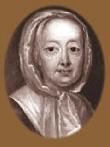


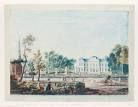

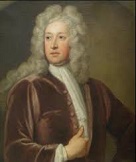
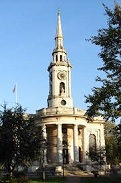

1712 On Jan 29 the Peace Congress of Utrecht in Holland opens in Utrecht, Holland on the Rhine River 23 mi. from Amsterdam (ends 1713); powerful Tory orator Henry St. John (1678-1751), philosopher of the London Court Party-hating Country Party (Old Whigs) is called to the House of Lords under the title 1st Viscount Bolingbroke, and begins his rise to the top of English govt. by negotiating the Peace of Utrecht. On Feb. 27 Mughal emperor (since 1707) Bahadur Shah I (b. 1643) dies, and his son Jahandar Shah (1661-1713) becomes Mughal emperor #8 of India (until Feb. 11, 1713). In Feb. to reward her for her jewel trick on the Pruth, Peter I the Great finally officially marries his Swedish-Lithuanian-who-knows-what mistress (since 1703) Catherine I, and decides to move the Russian capital from Moscow to his new digs at St. Petersburg (until 1922), ordering the nobles to move there and erect elaborate palaces, forbidding stone building anywhere else in Russia until the town is completed to his satisfaction; he also establishes the Russian Academy of Engineering in 1715; the center of Russian trade moves W from Vologda to St. Petersburg, causing the latter to shrink in importance after two cents. On Apr. 6 there is a slave rebellion in New York. In May Carolina is divided into North and South. In June Penn. bans the importation of slaves; after William Penn suffers the first of a series of stroke, his 2nd wife (since 1696) Hannah Callowhill Penn (1671-1726) becomes acting proprietor until her death in 1726. On July 24 120K French under Marshal Claude de Villars defeat 105K invading imperial forces under Prince Eugene of Savoy at the Battle of Denain in France after the English under the duke of Ormonde suddenly withdraw, allowing a bayonet charge to push them into the Denain River, with 18K imperial troops dead or drowned vs. 5K French troops; the French then recapture Douai, Le Quesnoy and Bouchain. On Aug. 11 after a Roman Catholic defeat, the Treaty of Aargau (Aarau) signed by the Roman Catholics and Protestants ends the Swiss War, granting Protestant superiority over Catholic cantons. On Sept. 14 Scottish gambling head-calculating economist John Law (1671-1729), who fled to Amsterdam in 1694 after killing a man in a duel in London, studied banking, and tried unsuccessfully in 1700 to interest the Scottish Parliament in a nat. bank founds the Compagnie de la Louisiane ou d'Occident in France, which obtains exclusive rights to trade in French territory around the Mississippi River for 25 years, with large land grants. On Oct. 12 big man Francis Nicholson becomes British gov. of Nova Scotia and Placentia (until Aug. 1717). On Nov. 12 Tokugawa Iyenobu (b. 1662) dies, and infant Iyetsugu becomes shogun #7 of Japan. On Nov. 15 (a.m.) Scottish nobleman Sir James Douglas-Hamilton, 4th Duke of Hamilton (b. 1658), after being created a peer of Britain (1st duke of Branded With the Mark of Shame, er, Brandon in Suffolk) for selling out his Scottish people and getting a "toothache" during the final vote on the Acts of Union, allowing them to be passed in the Scottish House of Lords (still, the very thought of a wild-eyed Celt sitting in the British House of Lords with the descendants of Edward I Longshanks?), and maybe worse, being created Knight of the Garter in Oct. (the only non-royal in Britain to be a knight of both Thistle and Garter), fights a famous sword duel in Hyde Park, London with this-bird-you-cannot-change longtime Whig opponent Charles Mohun, 4th Baron Mohun of Okehampton (1675-1712) (actually, Hamilton had been trying to steal his inheritance, and Mohun was a longtime dueling fool, and the Scot prick was made special envoy to Paris, and it was about time for him to fly?), who kills the pesky uppity Scot, after which he dies from his horrific wounds also, all of which is later covered in William Makepeace Thackeray's blockbuster 1852 novel The History of Henry Esmond, and causes Parliament to ban seconds in duels, causing the quicker and less gruesome pistols to become the weapon of choice - erin go bragh? In Nov. the Dutch Berbice plantations in Guyana are attacked by French buccaneers. On Dec. 20 a Swedish force of 12K defeats 24K Danes and Saxons at the Battle of Gadebesk. British West Indies slave owner William "Willie" Lynch makes a speech on the banks of the James River in Va., explaining to American slaveowners how to control (keep down) African slaves by exploiting skin color, age, and gender; duh, it's a 1990s Internet hoax - just lynch them when they get uppity? A war of succession begins between Bahadur Shah I's four sons in India. After borrowing money from the duke of Montrose and losing it in cattle speculation, the lands of Rob Roy McGregor (1671-1734) are seized, and he goes Celtic, gathers his clansmen and makes open war on the duke, stealing all the cattle of the district and kidnapping the factor with rents of more than 3K Scottish pounds; after becoming the Scottish Robin Hood, he ends his days peacefully under the protection of the duke of Argyll - see the movie? The last execution for witchcraft in England takes place. The first sperm whale is captured at sea by a Yankee from Nantucket - there's a dirty joke in there somewhere? Button's Coffee House is founded in London by Daniel Button, attracting brainy Whigs incl. Joseph Addison, fostering free journalism. Queene Anne touches 3-y.-o. Samuel Johnson to cure him of scrofula (TB). The long-standing Newton-Leibniz Priority Dispute over the invention of calculus between Isaac Newton and Gottfried Wilhelm von Leibniz is finally decided by a commission appointed by the Royal Society of London for er, Newton. A wharf is built on the River Trent in Burton upon Trent, England, allowing navigation to Nottingham and causing the town to become a major site for exporting beer to Hull and London, after which several breweries open by the end of the cent., ramping up after Burton brewer Samuel Allsopp learns to replicate the pale ale produced in London in 1822 and best them with their better water, going on to produce India pale ale (invented in the late 18th cent.) that is hopped-up to stay fresh during the long trip to India, and becomes popular in England by 1840; later railways are built allowing beer to be exported throughout Britain, and by 1880 Burton has 30+ breweries, producing 25% of all beer in Britain; too bad, after the Liberal govt. turns prude, the number shrinks from 20 in 1900 to eight in 1928, and three in 1928, incl. Bass (founded 1777), Marston's (founded 1834), and Ind Coope (founded in 1845). Architecture: Philip V of Spain creates the Biblioteca Real royal public library in Madrid. English Baroque architect Thomas Archer (1668-1743) begins St. Paul's Cathedral, Deptford in Deptford, Kent (near London), with sweeping semi-circular porticos (finished 1730). Gabriel Boffrand designs the Hotel de Montmorency in Paris. Inventions: Thomas Newcomen (1664-1729) invents the Newcomen Steam Engine, becoming the first practical device to harness steam power to produce mechanical work, and the first great invention of an Englishman; unfortunately it uses only one chamber and is only about 1% efficient - hi, I love your purse? Nonfiction: John Arbuthnot, The Art of Political Lying: The History of John Bull; popularizes John Bull as a personification of England or an Englishman; "an honest plain-dealing fellow, choleric, bold, and of a very inconstant temper... very apt to quarrel with his best friends, especially if they pretend to govern him". Sir Thomas Browne (1605-82), Concerning Some Urnes Found in Brampton Field in Norfolk (posth.); written in 1667. Samuel Clarke, The Scripture Doctrine of the Trinity, in Three Parts, Wherein All the Texts in the New Testament Relating to the Doctrine... Are Collected, Compared, and Explained; shows that Arius was right all along and the Trinity is not in the scriptures, but all the pretty people are clapping that they got it made; Sidney Godolphin begs him not to pub. it, and after he does it causes a firestorm of controversy, causing him to issue specious apologies to keep from being defrocked. Charles Davenant (1656-1714), Reports to the Commissioners for Public Accounts; argues for British trade with France to keep up with the Netherlands. John Dennis (1657-1734), Essay on the Genius and Writings of Shakespeare in Three Letters; Reflections, Critical and Satirical; a backatchya against Alexander Pope (1688-1744), comparing him to a hunchbacked toad. John Flamsteed (1646-1719) Historiae Coelestis; 400 incomplete observations of fixed stars, begun in 1676, pub. by order of Prince George of Denmark over Flamsteed's objections, after which he later burns 300 copies in Greenwick Park, with the soundbyte "I make a sacrifice to Heavenly Truth"; the final vers. is not pub. until 1725. Francois Massialot (1660-1733), Le Cuisinier Royal et Bourgeois (3 vols.) (1712-34). Cotton Mather (1663-1728), Curiosa Americana (1712-24). John Oldmixon (1673-1742), The Secret History of Europe (1712-5). Jonathan Swift (1667-1745), A Proposal for Correcting the English Language. Art: Giuseppe Crespi (1665-1747), The Seven Sacraments. Music: Arcangelo Corelli (1653-1713), 12 Concerti Grossi. G.F. Handel (1685-1759), Il Pastor Fido (opera) (London) (Nov. 22); libretto by Giacomo Rossi, based on the poem by Giovanni Battista Guarini; a flop. Plays: Pieter Langendijk (1683-1756), Het Wederzijds Huwelijks Bedrog (1712-4). Ambrose Philips, The Distrest Mother; adaptation of Racine's "Andromaque". Poetry: Alexander Pope (1688-1744), The Rape of the Lock (mock-heroic epic) (May) (2 cantos, 334 lines); rev. Mar. 2, 1714 into 5 cantos, 794 lines; his most popular poem, selling 3K copies in four days; mocks a high society quarrel between Belinda (Arabella Fermor) and Lord Petre, who had snipped a lock of her hair to use as a sex toy, while she is guarded by sylphs (guardian spirits of virgins); Uranus' moons Belinda, Umbriel and Ariel are named from chars.; "Forever cursed be this detested day, Which snatched my best, my favorite curl away! - love hurts? Births: English composer John Stanley (d. 1786) on Jan. 17 (old Style); student of Maurice Greene. Prussian Hohenzollern king #3 (1740-86) (Freemason) Frederick (Friedrich) II (the Great) (d. 1786) on Jan. 24 in Berlin; son of Frederick William I (1688-1740) and Sophia Dorothea. English portraitist Arthur Devis (d. 1787) on Feb. 19 in Preston, Lancashire. French Gen. Louis Joseph de Montcalm-Gozon, Marquis de Sain-Veran (d. 1759) on Feb. 28 in Chateau de Candiac (near Nimes). English dipththeria physician (Quaker) John Fothergill (d. 1780) on Mar. 8 in Carr End (near Bainbridge), Wensleydale, Yorkshire. French adm. Luc Urbain de Bouexic (Bouëxic), Comte de Guichen (d. 1790) on June 21 in Fougeres, Ille-et-Vilaine. Swiss-French deistic philosopher-writer-composer Jean-Jacques Rousseau (d. 1778) on June 28 in Geneva; mother dies from birth complications, father abandons him at age 10 after fighting a duel; at age 16 he becomes a vagrant, engraver's apprentice, servant, secy., and musical copyist - such sweet eyes and face? English composer John Hebden (d. 1765) on July 21 in Spofforth (near Harrogate), Yorkshire. German mathematician Johann Samuel Konig (König) (d. 1757) on July 31 in Budigen. French diplomat-statesman-gen. Cesar (César) Gabriel de Choiseul, Duc de Praslin (d. 1785) on Aug. 15; cousin of Etienne Francois, duc de Choiseul (1719-85). French printer-engraver Pierre Simon Fournier (le Jeune) (d. 1768) on Sept 15. Italian (Venetian) "Doge's Feasts" painter Francesco Lazzaro Guardi (d. 1793) on Oct. 5 in Venice; brother of Giovanni Antonio Guardi (1699-1760); last of the Venetian School. Scottish poet Alison (Alicia) Cockburn (Rutherford) (d. 1794) on Oct. 8 in Selkirkshire. British Whig PM (1763-5) George Grenville (d. 1770) on Oct. 14 in Wotton Underwood, Buckinghamshire; maternal uncle of William Pitt the Elder; educated at Eton College, and Christ Church, Oxford U. Austrian field marshal prince Charles Alexander Emanuel of Lorraine (d. 1780) on Dec. 12 in Luneville, Lorraine, France. Moravian bishop Peter Boehler (d. 1775) in Frankfurt am Main, Prussia; educated at the U. of Jena. Euro courtier, composer, and mystery man ("The Wonderman" - Voltaire) Comte de Saint Germain (Count of St. Germain) (d. 1784); son of Prince Francis II Rakoczi (1671-1735) of Transylvania and Duchess Violante Beatrice of Bavaria (1673-1731); Gian Gastone, last of the Medicis is his mother's brother-in-law; educated at the U. of Siena; claims to be 500 years old. English "Paradise Lost" composer John Christopher Smith (Johann Christoph Schmidt) (d. 1795) in Ansbach, Germany; Handel's secy. Deaths: Italian-born French astronomer Giovanni Domenico Cassini (b. 1625) on Sept. 14 in Paris. English vapor action Richard Cromwell (b. 1626) on July 12 in Cheshunt, Hertfordshire. French marshal Nicolas Catinat (b. 1637) on Feb. 22 in Saint-Gratien; Memoirs of Nicolas Catinat are pub. in 1819. Dutch painter Jan van der Heyden (b. 1637) on Mar. 28 in Amsterdam. French Bible critic Richard Simon (b. 1638) on Apr. 11 in Dieppe. English actor Edward Kynaston (b. 1640) in Jn. English plant anatomist Nehemiah Grew (b. 1641) on Mar. 25 in London. Indian Mughal emperor (1707-12) Bahadur Shah I (b. 1643) on Feb. 27 in Lahore. English politician Sidney Godolphin, 1st earl Godolphin (b. 1645) on Sept. 15 in St. Albans, Hertfordshire. French physicist Denis Papin (b. 1647). French marshal Louis Joseph de Bourbon, 3rd duc de Vendome (b. 1654) on June 11 in Vinaros, Spain; dies suddenly, and is buried in the Escorial. Scottish nobleman Sir James Hamilton, 4th duke of Hamilton (b. 1658) on Nov. 15 in Hyde Park, London (killed in a duel). Japanese shogun #6 (1709-12) Iyenobu (b. 1662) on Nov. 12. English satirist William King (b. 1663) on Dec. 25. German writer Christian Reuter (b. 1665). English politician Charles Mohun, 4th baron Mohun (b. 1675) on Nov. 15 in Hyde Park, London (killed in a duel). German Saxon field marshal Adam Heinrich Graf von Steinau (b. ?).
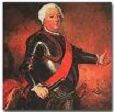




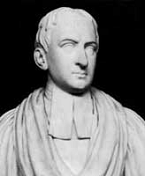
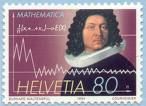


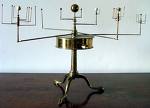



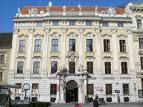
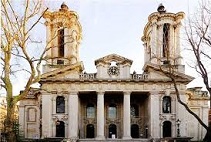



1713 There is a measles epidemic in Boston. On Feb. 11 Jahandar Shah (b. 1661) dies, and Baradar Shah I's grandson Mohammed (Muhammad) Shah (1685-1719) becomes Mughal emperor #9 of India (Great Mughal) (until Feb. 28, 1719), presiding over its breakup into loosely-knit states under the ascendancy of the Syed Brothers, Mughal gens. Syed Hassan Ali Khan Barha (1668-1722) and Syed Hussain Ali Khan Barha (1666-1722). On Feb. 25 Hohenzollern Prussian king #1 (since 1701) Frederick I of Prussia (b. 1657) dies after having drained the country of resources, and his son Frederick William (Friedrich Wilhelm) I (1688-1740) becomes king #2 of Prussia and elector of Brandenburg (until May 31, 1740), soon showing himself a heaven-spelled-backwards royal tightwad who likes tall soldiers for his military parades as he builds up the size of the army from 38K to 83.5K, making Prussia the 3rd biggest military power after Russia and France, introducing pigtails to the army. On Mar. 12-Oct. 1 English writer Joseph Addison (1672-1719) and Irish writer Sir Richard Steele (Isaac Bickerstaff) (1672-1729) pub. the daily The Guardian (175 issues). You get this, I get that, now who wants lemonade? On Apr. 13 the Treaty (Peace) of Utrecht, signed by France on the one hand, and England, Holland, Prussia, Savoy, and Portugal on the other, followed by more treaties signed on July 13 between Spain and England, and more on Aug. 13 between Spain and Savoy (and more in 1714 and 1715), all concluded by Viscount Bolingbroke against the wishes of nearly the entire English nation ends Louis XIV's wars, Queen Anne's War (Second War of the Grand Alliance) (begun 1701), and the War of the Spanish Succession (begun 1700), with the uniting of France and Spain under one king permanently forbidden, and the whole idea being to check France's ambitions by pumping up Ahnuld, er, Austria and Holland on its N, Prussia on its E, and Savoy on its SE, launching the inevitable process of unification of Germany and Italy in the 19th cent., while freeing England for fast commercial expansion; it recognizes the Protestant succession in England, the title of Philip V as king of Spain and the Spanish colonies, and cedes from Spain the Spanish Netherlands (that part which had belonged to the Hapsburgs), and cedes Minorca and Gibraltar to England, along with Hudson Bay, Nova Scotia (Acadia), and Newfoundland in Canada, and St. Christopher (Kitts) and Nevis, allowing France to retain Quebec; Port Royal is renamed Annapolis Royal in honor of Queen Anne, and remains capital of Nova Scotia until 1750; Prussia receives recognition of the royal title and possession of Neuchatel and the upper quarter of Gueldres, while its claim to the principality of Orange on the Rhone River (which gives its name to the Dutch royal line) is ceded to France; Portugal receives expanded boundaries in South Am.; Sicily is separated from Naples and given to Savoy (until 1720), along with territory in upper Italy in return for renouncing its claims on Spain, reserving the right of inheritance in case the House of Bourbon should become extinct; Count Wirich Philipp von Daun becomes the first Austrian viceroy of Naples; the Iroquois are recognized as British subjects; Britain obtains the asiento (monopoly of slave trade) with Spanish possessions for 30 years; France gains the college town of Douai; England emerges ascendant on the sea over France and the Netherlands, and Euro politics becomes all about Anglo-French and Austrian-Prussian rivalry, with Russia, Spain, Holland, Sweden, and the smaller German states playing both sides; French-speaking English poet-diplomat Matthew Prior (1664-1721), who helped England negotiate the 1697 Peace of Ryswick and was called back to negotiate the Peace of Utrecht gets saddled with the blame as "Matt's Peace" even though he personally disapproves of it, and after Queen Anne dies next year Robert Walpole gets him impeached and placed under house arrest in 1715-7, causing him to turn back to poetry; John Churchill, 1st Duke of Marlborough talks them into an exchange for a swap of his Principality of Mindelheim in Unterallgau, Bavaria with the county of Nellenburg (Mellenburg) in Austria, promoting it into a principality for him; too bad, Austrian law forbids it, and the plan is dropped in 1717. On Apr. 19 HRE Charles VI, living under the shadow of having no male offspring issues the Pragmatic Sanction, declaring that Hapsburg control of Austria, Bohemia, and Hungary are indivisible, and that in case he dies without male heirs his future daughter Maria Theresa (1717-80) will succeed him, with the daughters of HRE Joseph I and their descendants as backups; too bad, the male chauvinist nobility of Hungary doesn't want to go with this program and causes trouble, and the whole thing becomes the hot potato of the 18th cent.? On June 24 the Peace (Treaty) of Adrianople (Edirne) is signed in Edirne by Turkey and Russia, confirming the 1711 Treaty of the Pruth, with Russia agreeing to abandon its gains in the Azov region and eliminate its new Black Sea fleet; exiled Charles XII of Sweden turns public opinion against signer Baltaci Mehmet Pasha and gets him removed, but can't convince Sultan Ahmed III to resume his war with Russia, and instead he sends Charles XII back to Sweden, after which the peace lasts 25 years. On July 13 the Treaty of Portsmouth ends the war between the Mass. Bay Colony and the Eastern Abenakis, renewing the 1693 treaty made with gov. William Phipps. On July 13 the Anglo-Spanish Treaty of Utrecht confirms the Anglo-French treaties related to the English and French successions. On July 25 the Siege of Barcelona sees the 40K-man Bourbon army of Philip V of Spain siege Barcelona for 13 mo. (until Sept. 11, 1714), capturing it from 24.7K Catalonians and building the 5-cornered Citadel of Barcelona to prevent another rebellion by the Catalans, becoming the largest fortress in Europe. On Aug. 13 the Spanish-Savoyard Treaty cedes Naples and Sicily to Victor Amadeus II of the House of Hapsburg, along with the title of king in return for renouncing claims to the Spanish throne, and assures Savoy of an independent position in N Italy free from French control; Amadeus' alliance with Austria gives him the remainder of Monteferrat. On Aug. 20 after the HRE continues the war, it loses the Battle of Landau to the French under the duc de Villars, who then sieges Freiburg, which surrenders without a battle after Ferdinand Mayer negotiates a deal. The Swedes capitulate at Oldenburg. The Tuscarora War (begun 1711) ends with the Tuscaroras being driven out of N.C., eventually (1722) joining the Iroquois Five Nations, making it Six Nations. Can I have just one more dance with you my love in the moonlight? Father Perrault founds the ageless paradise of Shangri-La in the Valley of the Blue Moon in Tibet, and becomes the High Lama, who doesn't age in the next 200 years (1937 film Lost Horizon). Pope Clement XI pub. the papal bull Unigenitus, marking the end of toleration of Jansenist doctrine - welcome to the popular table, or not? Captain Frezier introduces the Chilean strawberry to France. Francois Didot (1689-1757) goes into the publishing biz in France, going on to found a dynasty. Pretty-boy Alessandro Scarlatti becomes musical dir. of the viceroy of Austria in Naples, and dir. of the Conservatory di Sant' Onofrio (until 1719). The Scriblerus Club is founded in London by Jonathan Swift (1667-1745), John Gay (1685-1732), Alexander Pope (1688-1744), John Arbuthnot (1667-1735), William Congreve (1670-1719) et al. to satirize pedantry in the form of fictional scholar Martinus Scriblerus; meanwhile Alexander Pope makes an unprecedented deal with publisher Barnaby Bernard Lintot (Lintott) (1675-1736) to translate Homer's "Iliad", with one vol. appearing every year by subscription for six years, for which he gets a 200 guinea per vol. advance, making him the first English poet who can support himself with poetry, "indebted to no prince or peer alive". French Bourbon Sun King (1643-1715) Louis XIV (the Great) (1638-1715) is presented with a coffee tree, and uses sugar as an additive in coffee for the first time. The Old State House at Washington and State Sts. in Boston, Mass. is built, becoming the seat of the Mass. Gen. Court until 1798, later becoming a landmark on the Boston Freedom Trail, and the oldest surviving public bldg. in Boston; in 1960 it is designated a nat. historic landmark. The Spanish Royal Academy (Real Academia Espanola) in Madrid is founded. The School of Dance is established at the Paris Opera. Architecture: Thomas Archer begins the Baroque St. John's Church in Smith Square, London (finished 1728), complete with four corner towers, becoming known as Queen Anne's Footstool after she allegedly kicked over her footstool and told Archer that she wanted it to look like that. Germain Boffrand designs the Hotel de Seignelay in Paris at 80 Rue de Lille. Prince Eugene's Palais Belvedere in Vienna is begun by Johann Lukas von Hildebrandt (1668-1745), who also begins the Palais Kinsky in Vienna, commissioned by Count Wirich Philipp von Daun. British MP (1707-14) James Brydges, 1st Duke of Chandos (1673-1744) begins the palatial £200K Cannons House in Little Stanmore (near Edgware), Middlesex (finished 1724), where he hosts G.F. Handel in 1718-19; the crowds get so big that he introduces 1-way roads; he starts with architect William Talman, switching in 1714 to John James, in 1715 to James Gibbs, in 1719 to John Price, and in 1723 to Edward Shepherd; it is demolished in 1747 to pay his debts. Inventions: English clockmaker George Graham (1674-1751) creates the first Orrery, a mechanical model of the Solar System, named for his patron Charles Boyle, 4th Earl of Orrery (1674-1731), and built by instrument maker John Rowley of London; Orrery gets the 2nd copy after the first goes to Austrian prince Eugene of Savoy (1663-1736). Science: Swiss mathematician Jacob Bernoulli (1654-1705) pub. the primitive form of the Law of Large Numbers, that the average of a large number of trials converges to the expected value. English (Cambridge) mathematician Roger Cotes (1682-1716) revises Newton's Principia Mathematica (begun 1709), contributing a preface touting Newton's Law of Gravitation as superior to Rene Descarte's Theory of Vortexes; 750 copies are printed. Japanese scientist Ekiken Kabara (-1714) first describes the concept of dietary control as a method for achieving good health and longevity. Nonfiction: Arthur Collier, Clavis Universalis, or A New Inquiry After Truth. Anthony Collins (1676-1729), A Discourse of Free-Thinking. Francois Fenelon (1651-1715), Traite de l'Existence et des Attributs de Dieu. Thomas Parnell (1679-1718), Essay on the Different Stiles of Poetry. Abbe Saint Pierre, Projet pour la Paix Perpetuelle. Music: G.F. Handel (1685-1759), Utrecht Te Deum; Teseo (Theseus) (opera) (Queen's Theatre, London) (Jan. 10); libretto by Nicola Francesco Haym, based on Philippe Qinault's "Thesee"; stars castrati Valeriano Pellegrini and Valentino Urbani. Giuseppe Tartini (1692-1770), Violin Sonata in G minor, B.g5 AKA the Devil's Trill Sonata, a difficult work that becomes his most popular work, and his favorite, allegedly composed by a devil that appeared at the foot of his bed; "One night, in the year 1713 I dreamed I had made a pact with the devil for my soul. Everything went as I wished: my new servant anticipated my every desire. Among other things, I gave him my violin to see if he could play. H ow great was my astonishment on hearing a sonata so wonderful and so beautiful, played with such great art and intelligence, as I had never even conceived in my boldest flights of fantasy. I felt enraptured, transported, enchanted: my breath failed me, and I awoke. I immediately grasped my violin in order to retain, in part at least, the impression of my dream. In vain! The music which I at this time composed is indeed the best that I ever wrote, and I still call it the 'Devil's Trill', but the difference between it and that which so moved me is so great that I would have destroyed my instrument and have said farewell to music forever if it had been possible for me to live without the enjoyment it affords me"; it is not pub. unti 1799; Art: Alexandre Francois Desportes, Spaniels with Dead Game. Jean-Antoine Watteau (1684-1721), L'Indifferent. Plays: Joseph Addison (1672-1719), Cato. John Gay (1685-1732), The Wife of Bath. Poetry: Henry Carey (1687-1743), Poems on Several Occasions. Alexander Pope (1688-1744), Windsor Forest; based on his life in Berkshire, home of Windsor Castle, celebrating the "Tory Peace" after the War of the Spanish Succession (1701-14). Jonathan Swift (1667-1745), Cadenus and Vanessa; written for his babe Esther Vanhomright, with his title Dean and her name in code; "'Tis an old maxim in the schools,/ That flattery's the food of fools;/ Yet now and then your men of wit/ Will condescend to take a bit." Edward Young (1683-1765), Poem on the Last Day; dedicated to Queen Anne. Births: Spanish mathematician and naval officer Jorge Juan y Santacilia (d. 1773) on Jan. 5 in Novelda, Alicante. French "Coelum Australe Stelliferum" astronomer Abbe Nicolas Louis de Lacaille (La Caille) (d. 1762) on Mar. 15 in Rumigny; educated at the College de Lisieux, and College de Navarre. Am. DOI signer Francis Lewis (d. 1803) on Mar. 21 in Llandaff, Cardiff, Wales; emigrates to the U.S. in 1734; great-great-great grandfather of film dir. William A. Wellman (1896-1975). French Clairaut's Theorem mathematician-astronomer Alexis Claude Clairaut (d. 1765) on May 13 in Paris. British PM (1762-3) and Scottish PM #1 (1707-) John Stuart, 3rd Earl of Bute (d. 1792) on May 25 in Edinburgh, Scotland. English writer-bookseller ("Father of English Children's Literature") John Newbery (d. 1767) on July 9 in Waltham St. Lawrence, Berkshire. French Neoclassical Pantheon architect Jacques-Germain Soufflot (d. 1780) on July 22 in Irancy (near Auxerre). Dutch prince (1735-80) Charles I of Brunswick-Wolfenbuttel (Brunswick-Wolfenbüttel) (d. 1780) on Aug. 1 in Braunschweig; eldest sun of Duke Ferdinand Albert II (1680-1735); brother of Duke Louis Earnest of Brunswick-Luneburg (1718-88). Spanish Bourbon king #2 (1746-59) (Roman Catholic) Ferdinand VI (the Learned) (d. 1759) on Sept. 23 in Madrid; 4th son of Philip V (1683-1746) and 1st wife Maria Luisa of Savoy. French Encyclopedist philosopher (atheist) Denis Diderot (d. 1784) on Oct. 5 in Langres, Champagne; educated in Jesuit schools. Polish Jewish scholar rabbi Yechezkel ben Yehuda Landau (d. 1793) on Oct. 8 in Opatow. Scottish mercantilist economist Sir James Denham Steuart, 3rd Baronet of Goodtrees and 7th Baronet of Coltness (d. 1780) on Oct. 21 in Edinburgh; educated at the U. of Edinburgh. French "The Story of Ernestine" novelist Marie-Jeanne Riccoboni (Laboras de Mezieres) (d. 1792) on Oct. 25 in Paris. Spanish missionary founder Father (St.) Miguel Josep "Junipero" Serra y Ferrer (d. 1784) on Nov. 24 in Petra, Mallorca; canonized by Pope John Paul II on Sept. 25, 1988; sainted by Pope Francis on Sept. 23, 2015; feast day: July 1. English "Tristram Shandy" novelist and Anglican clergyman Laurence Sterne (d. 1768) on Nov. 24 in Clonmel, County Tipperary, Ireland; British soldier father; grows up in Yorkshire; educated at Jesus College, Cambridge U. English travel writer Edward Wortley Montagu (d. 1776); son of Edward Wortley Montagu (1678-1761) and Lady Mary Wortley Montagu (1689-1762). John Tuberville Needham (d. 1781); British naturalist and proponent of abiogenesis. Scottish painter Allan Ramsay (d. 1784) in Edinburgh; son of poet Allan Ramsay (1681-1758). Jean Paul de Gua de Malves (d. 1785). Deaths: Am. minister Rev. Samuel Whiting Jr. (b. 1633) on Feb. 28. Hungarian Palatine prince (1681-1713) field marshal Pal Esterhazy (b. 1635) on Mar. 26 in Kismarton. French Huguenot pastor Pierre Jurieu (b. 1637) on Jan. 11 in Rotterdam, Netherlands. English clockmaker Thomas Tompion (b 1639) in London. English campanologist Fabian Stedman (b. 1640). English banker Francis Child (b. 1642). French travel writer Jean Chardin (b. 1643) on Jan. 5 in Chiswick, London. Italian composer Arcangelo Corelli (b. 1653) on Jan. 8 in Rome. Prussian king #1 (1701-13) Frederick I (b. 1657) on Feb. 25 in Berlin. English actress Elizabeth Barry (b. 1658) on Nov. 7. English physicist Francis Hauksbee (b. 1666); first to study capillary action - proof that the year 1666 sucks?
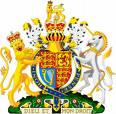


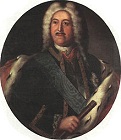
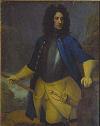
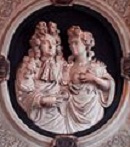

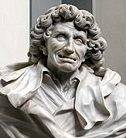
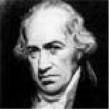


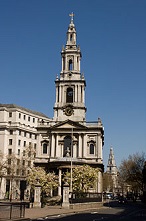
1714 On Mar. 2 (Feb. 19 Old Style) the Finnish army under Swedish gen. Carl Gustaf Armfelt (1666-1736) is crushed by the Russian army at the Battle of Napue (Storkyro) (Isokryo) near the Storkyro River in Finland, ending Swedish control and starting the Greater Wrath (Russian occupation of Finland) (ends 1721); Russian field marshal Mikhail Mikhailovich Golitsyn (Galitzine) (1675-1730) becomes Russian gov. of Finland (until 1721). On Mar. 7 France signs the Treaty (Peace) of Rastatt with HRE Charles VI of Austria in his own name, returning Freiburg and Breisach to the HRE, followed on Sept. 7 by the Treaty of Baden (Switzerland) in the name of the empire, ending hostilities with France; Austria takes possession of the Spanish Netherlands with a barrier agreed on for Holland, and is restored to Naples, Sardinia and Milan; the electors of Bavaria and Cologne have their bans of the empire removed and are reinstated; France keeps Strasbourg, Alsace and Landau; the HRE still refuses to recognize the Bourbons in Spain, and their war continues until 1720. On June 26 Spain and the Netherlands formalize their peace. In July the English Parliament passes the Longitude Act, creating a Board of Longitude (Commissioners for the Discovery of the Longitude at Sea) to create an Apollo Project to make an accurate chronometer so that the British Navy can create the empire where the Sun never sets, with a 20K pound reward offered. On July 20 the Bridge of San Luis Rey falls, killing Esteban, Uncle Pio, Marquesa de Montemayor, Pepita, and Jami; Franciscan Brother Juniper investigates - 1927 Thornton Wilder novel. In July Viscount Bolingbroke gives up trying to ditch Robert Hartley for the time being, and begins a plot to form a ministry favoring a Jacobite succession; too bad that Queen Anne's sudden death foils him? On Aug. 1 after a 1-mo. crisis occasioned by her impending death, Queen (since Mar. 8, 1702) Anne (b. 1665), last of the Stuart dynasty dies childless, and after some shenanigans where the earl of Oxford is fired as lord treasurer on July 29 and Lord Shrewsbury (who became lord lt. of Ireland last year and hurries back) is appointed in his place on July 30, going on to throw his weight in favor of the elector of Hanover and against James II and the Jacobites, she is succeeded by the eldest son of Electress Sophia of Hanover, granddaughter of James I through his daughter Elizabeth Stuart (1596-1662) (Queen Elizabeth of Bohemia) and Palatine Elector Frederick V (1596-1632), 54-y.-o. genuine Kraut George Louis, elector of Hanover, who becomes George (Georg) I Ludwig of Hanover (1660-1727) (the 50th British monarch) (until June 22, 1727), landing in England on Sept. 18; the Stuart Dynasty (founded 1371) ends, and the Hanover, Saxe-Coburg, and Windsor Dynasty begins (ends ?); George I never learns to speak or read English, and comes to England without his wife but with three German mistresses and a retinue of Germans; his cousin-wife Sophia Dorothea of Celle (1666-1726) was imprisoned for an affair in 1794, and remains in captivity in the Castle of Ahlden until her 1726 death; his friend Gottfried Wilhelm Leibniz, who helped angle him into power is snubbed because of the big Calculus dispute with Isaac Newton, and he is forbidden to come to London until he finishes a history of the Brunswick family commissioned by his father 30 years earlier; the Whigs regain control of Parliament, and George I appoints a mostly Whig cabinet led by Lord Townshend; Robert Walpole, a strong Hanoverian is restored to his fortune; on Aug. 28 George deposes Viscount Bolingbroke and reinstates the duke of Marlborough; Robert Harley is succeeded by as PM (until 1715); by now the cabinet is assuming its modern form as a committee of leaders of the majority in Parliament that takes the blame for the king's policy mistakes, as his royal personage is sacred and inviolable and somebody's head must always roll? On Nov. 11 King Karl (Charles) XII returns from captivity in Turkey to Stralsund, Sweden and ends attempts to replace him. On Dec. 9 the Seventh Ottoman-Venetian War (ends 1718) begins when the Ottoman Empire declares war on Venice after they seize an Ottoman ship belonging to grand vizier Damad Hasan Pasha and grant sanctuary to Montenegro Prince-Bishop Danilo I, assembling an army of 70K in Macedonia along with 80 ships under Adm. Canum Hoca to take on Venice's 80K men and 42 ships under Capt. Daniel Delfin. James Butler, 2nd duke of Ormonde is dismissed as CIC of the British armies, and is impeached for his Jacobite sentiments, causing him to flee to France then Spain. The Schism Act is passed in England (until 1719), stopping Dissenters from running schools or doing private tutoring. Witch trials are abolished in Prussia. Kev Fa III (Ang Im) (d. 1722) becomes king of Cambodia. The British Board of Trade enters a long period of lethargy (until 1748), its eight parliamentary members regarding it as a sinecure. George Augustus (George II) and his wife Caroline of Anspach come to London with George I, and her home becomes a trendy place for Alexander Pope, Lord Chesterfield, John Gay, Lord Hervey, and other deep thinkers and cool cats. Natchitoches (pr. NAK-uh-tush) in French La., named after the Natchitoches Indian tribe is founded by French capt. Louis Antoine Juchereau de St. Denis (1674-1744), becoming the oldest permanent settlement in the La. Purchase; the sister city of Nacogdoches, Tex. (pr. naka-DOE-shis), named after the Caddo family of Indians is founded in 1716 as a church. French Baroque organist-composer Michel Richard de Lalande (1657-1726), tutor of the daughters of Louis XIV becomes dir. of the French chapel royal (until 1726), going on to please his royal boss by composing almost 80 grand motets, sacred music written for choir, soloist, and large orchestra. Young Benjamin Franklin (b. 1706) attends Boston Latin public school. William Northmore loses his entire $850K fortune playing cards, and the townspeople of Okehampton, England feel so sorry for him that they elect him to Parliament every year from this year until his death. Worcester College at Oxford U., named after benefactor Sir Thomas Cookes, 2nd Baronet (1648-1701) of Worcestershire is founded by refurbishing Gloucester Hall (founded in 1283 for Benedictine monks, and dissolved in 1539), becoming known for its quaint medieval cottages. The Mercury is founded in Norwich, becoming the oldest English newspaper to survive to modern times (until 1872). The Princess of Palatine remarks that Chinese tea is as fashionable in Paris as chocolate is in Spain; meanwhile tea is introduced to the Am. colonies; French tea lovers incl. Louis XIV, Cardinal Mazarin, royal minister Pierre Seguier, playwright Racine, and writer Madame de Genlis; later the salonist Marguerite de la Sabliere (Sablière) (Hessein) (1640-93) introduces the fashion of adding milk (to prevent her eggshell teacups from cracking?), which is quickly adopted by the English. Architecture: In Feb. after returning to London from Rome in Nov. 1708, where he studied under Carlo Fontana, Aberdeen, Scotland-born architect James Gibbs (1682-1754) begins the £16K St. Mary le Strand Church in Westminster, London (finished Sept. 1717, consecrated Jan. 1, 1723), becoming the first completed for the Commission for Building Fifty New Churches; the Italianate interior is inspired by Luigi Fontana and Michelangelo, and the steeple is influenced by Sir Christopher Wren; too bad, after a great quantity of stone purchased for a statue of Queen Anne is ordered to be reused after her 1714 death, he ends up extend the ground plan N-S, making it oblong, and add extravagant Baroque ornamentation, pissing-off critics esp. after a decorative urn falls on a passerby during a procession in 1802; either way, the bldg. makes Gibbs a star. Gabriel Boffrand designs the Hotel de Torcy in Paris; in 1803 it is acquired by Eugene de Beauharnais, who rebuilds it in the Empire style, becoming the Hotel Beauharnais, later becoming the official residence of the German ambassador. After he croaks on July 4, the Magliabechiana Library in Florence is founded by bibliophile scholar-librarian Antonio di Marco Magliabechi (Magliabecchi) (1633-1714) (librarian to Grand Duke Cosimo III de' Medici of Tuscany since 1673), who bequeaths his 40K-vol. library; in 1743 a law requires every work pub. in Tuscany to have a copy submitted; in 1747 it is opened to the public; in 1861 its holdings are merged by Victor Emmanuel II with the Biblioteca Palatina grand ducal private lirary; in 1870 it collects copies of all Italian pubs.; in 1885 it is renamed the Nat. Central Library of Florence (BNCF). Inventions: French surgeon Dominique Anel (1679-1730) invents the fine-point Anel Syringe. Daniel Gabriel Fahrenheit (1686-1736) of Danzig invents the 32-212 temperature scale for his new mercury thermometer; mercury solidifies at -39 C. The first crude typewriter is patented by Henry Mill (1683-1711) in England. Nonfiction: Gottfried Arnold, Unpartheyische Kirchen und Ketzer-Historie (3 vols.). Justus Bohmer (1674-1749), Jus Ecclesiasticum Protestantium. Dimitrie Cantemir (1673-1723), Description of Moldavia. Francois Fenelon (1651-1715), Letter to the French Academy; the relationship between lit., politics and religion. Alexander Helladius, The Current Status of the Greek Church (Status Proesens Ecclesiae Graecae); lambastes those who translate the Bible into vernacular Greek - like the apostles spoke? Gottfried Wilhelm von Leibniz (1646-1716), La Monadologie; pub. posth.; 90-paragraph philosophical magnum opus that proposes that the Universe is composed of eternal, indecomposable, irreducible elementary particles ("substantial forms of being") with blurred perceptions of each other, which can be compared to Descartes' corpuscles, never interacting but each reflecting the entire Universe in a pre-established harmony (little mirrors of the Universe); monads are the true centers of all force, while space, matter, and motion are mere phenomena; too bad, he considers each human being to be a monad in an attempt to overcome the mind-matter and free will problems. Isaac Newton (1643-1727), Opticks; advances the corpuscular theory of light; Query 31 questions whether gravity can be responsible for chemical attraction, admitting it "not improbable but that there may be more attractive Powers than these. For Nature is very constant and conformable to Herself" - he misses electricity by just that much? John Oldmixon (1673-1742), Arcana Gallica, or the Secret History of France for the Last Century. Adriaan Reland (Hadriani Relandi) (1676-1718), Palestina ex Monumentis Veteribus Illustrata; based on his tour of Palestine, in which he surveyed 2.5K places mentioned in the Bible or Mishnah, drawing a map and taking a census; he finds that most of Palestine is desolate, with most of the pop. concentrated in Jerusalem, Acre, Tzfat, Jaffa, Tiberius, and Gaza, and most of them Jews, with Christians being #2; the few Muslims he sees are nomad Bedouins, with 120 Muslims of the Natsha family and 70 Shomronites living in Nablus (Shchem), the most he finds in one place; in contrast, 700 Christians live in Nazareth in Galilee, and 5K live in Jerusalem, mostly Jews, with some Christians; Gaza has 550 residents, 50% Jews, and most of the rest Christians; Tiberius and Tzfat are mostly Jewish. Music: Reinhard Keiser (1674-1739), L'Inganno Federle oder Der Getreue Bertrug (opera) (Hamburg). Plays: Susanna Centlivre (1667-1723), The Wonder: A Woman Keeps a Secret; dedicated to George I. Prosper Jolyot de Crebillon (1674-1762), Xerxes; flops after one perf. Alexander Pope (1688-1744), The Wife of Bath. Nicholas Rowe (1674-1718), The Tragedy of Jane Shore (Drury Lane, London) (19 perf.); stars Mrs. Oldfield. Poetry: Susana Centlivre (1667-1723), A Woman's Case. John Gay (1685-1732), The Fan; The Shepherd's Week (pastoral). Edward Young (1683-1765), The Force of Religion; or Vanquish'd Love; on the execution of Lady Jane Grey and her hubby; On the Late Queen's Death and His Majesty's Accession to the Throne; praises the new king indecently soon? Births: English surgeons (co-founder of orthopedics) Percivall Pott (d. 1788) on Jan. 6 in London. French Rococo sculptor Jean Baptiste Pigalle (d. 1785) on Jan. 26 in Paris. English lord chancellor Charles Pratt, 1st Earl of Camden (d. 1794) on Mar. 21; 3rd son of Sir John Pratt (1657-1725); Camden, N.J. is named after him. Portuguese king (1750-77) Joseph (Jose) I (the Reformer) (d. 1777) on June 6 in Ribeira Palace, Lisbon; son of John V (1689-1750). German classical-Rococo "Orfeo ed Euridice" opera composer Christoph Willibald Ritter von Gluck (d. 1787) on July 2 in Erasbach (Berching), Bavaria; music teacher of Marie Antoinette and Antonio Salieri. Welsh "Lake Avernus" painter ("Father of British Landscape Painting") Richard Wilson (d. 1782) on Aug. 1 in Penegoes, Montgomeryshire. French painter Claude-Joseph Vernet (d. 1789) on Aug. 14. French sensationalist philosopher Abbe Etienne Bonnot de Condillac (d. 1780) on Sept. 30 in Grenoble; brother of Gabriel Bonnot de Mably (1709-85); can't read till age 12+. English "The Schoolmistress" poet William Shenstone (d. 1763) on Nov. 13 in Halesowen, Worcestershire. English "Calvinist Methodist" evangelist (cross-eyed) George Whitefield (d. 1770) (pr. WHIT-field) on Dec. 16 inu Gloucester; educated at Pembroke College, Oxford U. American scientist ("Father of Seismology") John Winthrop (d. 1779). German harpsichordist-composer Carl (Karl) Philipp Emanuel Bach (d. 1788) in Weimar; 2nd son of J.S. Bach (1685-1750). Deaths: German electress-dowager Sophia of Hanover (b. 1630) on June 8 in Herrenhausen, Hanover. Italian bibliophile scholar-librarian Antonio Magliabechi (b. 1633) on July 4 in Florence. Italian physician Bernardino Ramazzini (b. 1633) on Nov. 5 in Padua. German duke of Brunswick-Luneburg (1685-1714) Anthony Ulrich (b. 1633) on Mar. 27 in Salzdahlum. English colonial gov. Sir Edmund Andros (b. 1637) on Feb. 24 in London. Austrian economist Philipp von Hornigk (b. 1640) on Oct. 23 in Passau. English astrologer John Partridge (b. 1644) (d. 1715?). French economist Pierre Le Pesant, Sieur de Boisguillebert (b. 1646) on Oct. 10. English royal physician John Radcliffe (b. 1652). English economist-politician Charles Davenant (b. 1656) in London. Welsh minister Matthew Henry (b. 1662) on June 22 in Nantwich (apoplexy); dies while en route from Chester to London. German architect Andreas Schluter (b. 1664) in May. English queen (1702-14) Anne (b. 1665) on Aug. 1 in Kensington Palace, London.



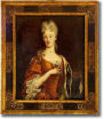

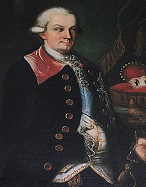
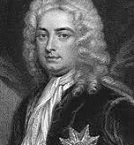

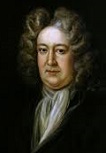

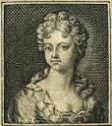

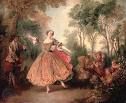

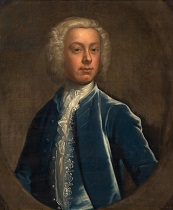

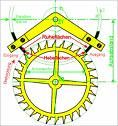


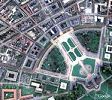
1715 The Maunder Minimum (period of low sunspot counts) ends (began 1645). Early in the year an election in England returns a large Whig majority to the House of Commons; the first Parliament of George I convenes, and proceeds to impeach Bolingbroke and other leading Tories, causing many Tories to join the Jacobites in their impending First Jacobite Rebellion which begins when widespread dissatisfaction with an alien Kraut king causes riots in England, causing the Riot Act to be passed in June, empowering a justice of the peace to read 12 or more persons the act, giving them 1 hour to disperse or become guilty of a felony; Tory support for the rebellion causes the Whigs to gain an ascendancy in Parliament until the reign of George III, starting with Charles Howard, 3rd Earl of Carlisle (1669-1738), who replaces Charles Montagu, 1st earl of Halifax, from May 23 to Oct. 10, and is then replaced by Robert Walpole (1676-1745) as chief minister of the British cabinet (chancellor of the exchequer and first lord of the treasury) (until 1717), where he becomes known as Cock Robin, founder of the Robinocracy; too bad, although Louis XIV had promised to help the Old Pretender, his death causes loss of French support, and Bolingbroke flees to France, while his Catholic fence-sitting friend Alexander Pope manages to equivocate enough (and pay enough bribes?) to remain and collect his huge Homer royalties. In Feb. after Italian Cardinal Giulio Alberoni (1664-1752) becomes effective ruler of Spain (until 1719), the Treaty of Madrid makes peace between Spain and Portugal. In Mar. Viscount Bolingbroke flees to France, and in Aug. is attainted, preventing him from returning to England until 1722; in France he becomes the secy. of state to English Old Pretender James Francis Edward Stuart. On Apr. 22 there is a total solar eclipse in London, and rising-star Edmond Halley sells maps predicting its path. On July 24 (Wed.) the 12-ship 1715 Spanish Treasure Fleet, biggest in history, carrying a huge load of treasure stored during the Spanish War of Succession (which left Spain bankrupt, but was too risky to attempt to transport) leaves Havana to act as dowry for sexually-denerate Philip V's wedding to Elizabeth Farnese (1692-1766); too bad, on July 31 it runs into a hurricane and is wrecked off the Fla. coast near modern-day Vero Beach, killing 1K sailors, after which only 30% of the treasure is recovered, the rest becoming known as the Queen's Dowry; Farnese goes through with the marriage, then virtually rules Spain through pussy power? On Aug. 12 English poet laureate (since 1692) Nahum Tate (b. 1652) dies after calling bard John Dryden a modern "Asaph" (1 Chron. ch. 25), and Nicholas Rowe (1674-1718), who produced eight plays between 1700-14 becomes poet laureate of England (until Dec. 6, 1718); "Guilt is the source of sorrow/ 'tis the fiend, Th' avenging fiend,/ that follows us behind, With whips and stings" (Rowe). It's 1715, so it's time for Louis 15? On Sept. 1 the "Grand Monarque", big-wigged French Bourbon Sun King Louis XIV the Great (b. 1638) dies after an unprecedented reign of 72 years 4 mo. (since May 14, 1643) (3 x 24), and his 5-y.-o. great-grandson Louis XV (the Well-Beloved) (1710-74) (well-laid?) succeeds him as French Bourbon king #4 (until May 10, 1774) (a mere 58 years 8 mo.); on Sept. 2 Louis XIV's will creating a regency council is voided by the French parliament, which gives Louis XIV's nephew Philippe II, Duke of Orleans (1674-1723) full powers as regent (until 1723); the royal court moves from Versailles to Paris, the French nobility begins to regain its power and enjoy the frivolous life, as captured by painter Nicolas Lancret (1690-1743), the monarchy loses the power of taxation, and things lighten up a bit; as the saying goes, "It's the time of the regency and we can do everything except penance"; the ban on Italian comedy is lifted; Rococo painter Antoine Coypel (1661-1722), son of Noel Coypel becomes court painter; the Baroque style begins to go out in favor of the Rococo (Fr. "rocaille" = rock work) (light Baroque) style; Louis XV grows up a superstitious skirt-chaser known for his many mistresses (Duchess of Chateauroux, Madame de Pompadour, Madame du Berry), while female hairstyles turn into lofty curl constructions stiffened with wire and topped by flowered and plumed caps or hats; Bourbon king Philip V of Spain begins to scheme for the throne of France, while Charles VI of Austria covets the throne of Spain. In Sept. Jacobite noble "Bobbing John" Erskine, 6th Earl of Mar leads an uprising of "the Fifteen" in Scotland, who want to put the Old Pretender James III on the British throne, and in Dec. he arrives from France at Peterhead; too bad, on Nov. 13 they are defeated at the Battle of Sheriffmuir and the Battle of Preston; the Macrae Clan is hit especially hard; meanwhile James Butler, 2nd duke of Ormonde (d. 1745) leads an unsuccessful Jacobite invasion of England from Spain, causing Parliament to confiscate his estates next year, and he spends the rest of his life at the Spanish court. On Nov. 15 at the Battle of Stresow on the Island of Rugen, the Allied army under Prince Leopold of Anhalt Desau defeats the Swedes under Charles XII; Strasland falls on Dec. 24. The Turks under Ahmed III retake the Peloponnesus (Morea) and the Ionian Isles (except Corfu) from Venice; Timus is the last to fall. Mir Vays dies, and his son Mir Abdullah Mahmud becomes ruler of Kandahar (Qandahar), plotting to invade Safavid Persia. After the 4th Lord Baltimore becomes Anglican, the colony of Md. reverts from a royal colony to proprietary status. The Yamasee and allied Indian tribes in S.C. revolt, and are driven into Spanish Fla. The Otomi people of C Mexico (modern-day states of Queretaro, Guanajuato, Hidalgo, Michoacan, and Mexico), known for shorter stature and darker color than neighboring tribes, and a monosyllabic language are finally subdued by the Spanish. Riots and demonstrations for James III the Old Pretender cause the Whig English Parliament to pass the Septennial Act of 1715/1716, lengthening its term from three to seven years, giving them more time to deal with the Jacobites and enjoy their domination. French Protestant reformer Antoine Court (1696-1760), who addresses audiences of 10K and more convokes the first Synod of the Desert - when the weight of the world is upon you? His father failing to send him to Harvard, young Benjamin Franklin attends George Brownell's school in Boston, where he excels in writing but fails in math; his two years of schooling end. Italian Jesuit Giuseppe Castiglione (1688-1766) arrives in China, influencing Chinese painting with his unique Euro blend. Karlsruhe (Carlsruhe) (Ger. "Charles' rest") in Wurttemberg-Baden, Germany 5 mi. E of the Rhine River 30 mi. W of Stuttgart is founded by Swedish-born Charles Louis, Hereditary Prince of Baden (1755-1801), with streets radiating like spokes from the Palace (Schloss). Vaudevilles first appear in Paris. Irish actor James Quin (1693-1760) appears for first time in Drury Lane in London as Bajazet in Nicholas Rowe's "Tamerlane". King George I of England donates a valuable library to Cambridge U., and dispatches a regiment to Oxford U.; "One was a learned body in need of loyalty, the other was a loyal body in need of learning." Architecture: After HRE Charles VI fulfills a vow made during the 1713 Black Plague sweeping Vienna to build a church dedicated to his namesake St. Charles Borromeo, Fischer von Erlach begins the Karlskirche in Vienna (finished 1739). The first dock in Liverpool, England is built. Ft. Michilimackinac is built by the French overlooking the Straits of Mackinac between Lake Huron and Lake Michigan. Sports: Thomas Doggett founds an annual 4 mi. 5 furlong (7.4km) rowing race on the Thames River between London Bridge and Cadogan Piere in Chelsea for six apprentice watermen, awarding Doggett's Coat and Badge to the winner, becoming the oldest rowing race and prize on Earth. Inventions: George Graham (1673-1751) of London invents the Graham Deadbeat Escapement, improving the accuracy of pendulum clocks. John Lethbridge of England invents a wood-leather diving suit for salvage work. Sybilla Masters (-1720) becomes the first American to be granted an English patent, for a corn-grinding mill; the patent is issued in her husband Thomas' name - I need a lover who won't drive me crazy? Nonfiction: Colen Campbell (1676-1729), Vitruvius Britannicus, or, The British Architect (3 vols.) (1715-25); first original architectural work pub. in England since John Shute's "First Groundes"; a student of James Smith disses the "excesses" of Baroque style and declares British independence from Europe, dedicating the work to George I of England, popularizing neo-Palladian Architecture in Britain and British Am., making him a star, riding on a boom in country house and villa building among the Whig oligarchy. Pierre Francois Xavier de Charlevoix (1682-1761), Histoire de l'établissement, du progrès et de la décadence du Christianisme dans I'empire des japons. John Dennis (1657-1734), Remarks Upon Mr. Pope's Translation of Homer; A True Character of Mr. Pope. Elizabeth Elstob (1683-1756), Rudiments of Grammar for the English-Saxon Tongue; first work on the subject in English; the preface "An Apology for the Study of Northern Antiquities" disputes Jonathan Swift, causing him to change his views; too bad, her brother and fellow scholar William Elstob (1673-1715) dies, leaving her in debt, causing her to have to give up her studies for nanny work. Giacomo Leoni (1686-1746), The Architecture of A. Palladio, in Four Books (4 vols.) (1616-20); the first English translation of Palladio's "Four Books on Architecture", becoming a big hit despite being filled with flaws, popularizing Palladian (Georgian) architecture in England and making it the std. until the advent of Robert Adam's Neoclassicism. Bernard de Mandeville (1670-1733), The Fable of the Bees; or, Private Vices, Publick Benefits; incl. the poem The Grumbling Hive; or, Knaves turn'd Honest, first pub. in 1705; a hive of greedy self-centered bees thrive until they begin seeking individual honesty and virtue, proving that without private vices there can be no public benefit; also incl. An Enquiry into the Origin of Moral Virtue; popular exposition of Underconsumption Theory, which claims that prosperity is increased by spending rather than saving; too bad, its attack on Christian virtues incl. temperance causes it to be convicted as a nuisance in 1723, and underconsumption theory to be ignored until Thomas Malthus' Principles of Political Economy (1820); repub. in 1723 with An Essay on Charity and Charity Schools and A Search into the Nature of Society; claims that charity schools don't reform the poor since it only makes them want material things and become as corrupt as the educated and wealthy. John Oldmixon (1673-1742), Memoirs of North Britain. Humphrey Prideaux (1648-), The Old and New Testament Connected in the History of the Jews and Neighbouring Nations: From the Declension of the Kingdoms of Israel and Judah to... (1715-7); uses the term "Vulgar Era", first used by Johann Kepler in 1635. Brook Taylor (1685-1731), Methodus in Crementorum Directa et Inversa; announces the discovery of the calculus of finite differences, and Taylor Series. Isaac Watts (1674-1748), Divine Songs for Children; incl. I Sing the Mighty Power of God. Music: G.F. Handel (1685-1759), Amadigi di Gaula (opera) (Haymarket Theatre, London) (May 25); stars castrato Nicolo Grimaldi. Reinhard Keiser (1674-1739), Fredegunda (opera) (Hamburg); L'Amore Verso la Patria oder Der Sterbende Cato (opera) (Hamburg). Art: G.B. Tiepolo, Sacrifice of Isaac. Plays: Henry Carey (1687-1743), The Contrivances (first play). Susanna Centlivre (1667-1723), The Gotham Election; satire of bribery in Parliamentary elections, pissing-off the mgrs. of Drury Lane, who ban it, so that it first debuts in 1724 at the Haymarket Theatre. John Gay (1685-1732), The What D'ye Call It. Gian Vencenzo Gravina, Della Tragedia. Pieter Langendijk, Krelis Louwen of Alexander de Groote op het Poeettmaal; De Wiskenstenaars of 't Gevluchte Juffertje. Nicholas Rowe (1674-1718), The Tragedy of Lady Jane Grey; a flop, causing him to give up playwriting. Poetry: John Gay (1685-1732), Rural Sports. Alexander Pope (1688-1744) (tr.) Homer's Iliad (6 vols.) (1715-20); "A peformance which no age or nation could hope to equal" (Dr. Samuel Johnson); "It is a pretty poem, Mr. Pope, but you must not call it Homer" (Richard Bentley). Matthew Prior (1664-1721), Solomon, or The Vanity of the World; Alma, or The Progress of the Mind. Novels: Alain-Rene Lesage (1668-1747), L'Histoire de Gil Blas de Santillane (4 vols.) (1715-35); #1 French picaresque novel. Births: French anti-religious hedonist materialist utilitarian philosopher (Freemason) Claude Adrien Helvetius (Helvétius) (d. 1771) on Jan. 26 in Paris; born to a family of physicians originally named Schweitzer (Ger. "Swiss"); husband (1751-) of Anne-Catherine de Ligniville, Madame Helvetius (1722-1800); appointed royal tax collector in 1738, making 100K crowns/year, allowing his wife to maintain a popular salon in Paris; known for her clowder of pampered Angora cats. English richest woman in Britain Margaret Cavendish Bentinck, Duchess of Portland (d. 1785) on Feb. 11 in Welbeck Abbey, Nottinghamshire; only child of the 2nd earl of Oxford and Mortimer and Lady Henrietta Holles (1694-1755); grows up in Wimpole Hall, Cambridgeshire; wife of William Bentinch, 2nd duke of Portland (1709-62); mother of William Cavendish-Bentinck, 3rd duke of Portland (1738-1809); great-great-great-great-grandmother of Elizabeth II. English "The School for Lovers" playwright and poet laureate (1757-85) William Whitehead (d. 1785) on Feb. 12 in Cambridge; educated at Clare College, Cambridge U. French engraver-printmaker-critic Charles-Nicolas Cochin II (the Younger) (d. 1790) on Feb. 22 in Paris; son of Charles-Nicolas Cochin the Elder (1688-1754) and Louise-Magdeleine Horthemels (1686-1767). Am. landowner Ephraim Williams Jr. (d. 1755) on Mar. 7 (Feb. 24, 1714 Old Style) in Newton, Mass. German poet Ewald Christian von Kleist (d. 1759) on Mar. 7 in Zelin (near Koslin), Pomerania. Spanish sign language inventor (Jewish) Jacob Rodrigues Pereira (Jacob Rodrigue Pereire) (d. 1790) on Apr. 11 in Peniche; of Marrano Portuguese descent; grandfather of Emile Pereire (1800-75) and Isaac Pereire (1806-80); emigrates to France in 1741. German poet Christian Furchtegott (Fürchtegott) Gellert (d. 1769) on July 4 in Hainichen, Saxony; educated at Leipzig U. French Physiocratic economist (coiner of the term "mercantilism") Victor de Riquetti, Marquis de Mirabeau (d. 1789) on Oct. 15 in Pertuis; father of Comte de Mirabeau (1749-91). Russian Romanov tsar #7 (1727-30) Peter II (d. 1730) on Oct. 23 in St. Petersburg; only male-line grandson of Peter I the Great (1672-1725). German banker Johann Philipp Bethmann (d. 1793) on Nov. 30 in Nassau; eldest son of Simon Moritz Bethmann (1687-1725); brother of Simon Moritz Bethmann (1721-82); father of Simon Moritz (1768-1826). Russian gen. Count Gottlieb Curt Heinrich von Tottleben (d. 1773) on Dec. 21 in Tottlebe, Thuringia, Saxony. Irish fur trader and British maj. gen. Sir William Johnson, 1st Baronet (d. 1774) in Smithtown, County Meath; emigrates to British Am. in 1737; supt. of affairs of the Six Nations 1744-55; supt. of Indian affairs N of the Ohio River 1755-74; founder (1762) of Johnstown, N.Y. British adm. Sir Charles Saunders (d. 1775); not to be confused with Sir Charles Edward Saunders (1867-1937). French philosopher Etienne Bonnot de Condillac (d. 1780). English poet Richard Jago (d. 1781). French marshal Charles de Rohan, Prince de Soubise (d. 1787); inventor of soubise (onion-butter sauce). English engineer-physicist William Watson (d. 1787). French explorer +Francois de La Verendrye (Vérendrye) (d. 1794) in Sorel; 3rd son of Pierre de la Verendrye (1685-1749); brother of Louis-Joseph de La Verendrye (1717-61). Scottish deaf-mute teacher Thomas Braidwood (d. 1806) in Hillhead Farm, Covington, Lanarkshire; educated at Edinburgh U.; opens the first school for deaf-mutes in the British Empire, at Hackney near London (1760); uses the Heinicke "sound" lip-reading system. Deaths: French king (1643-1715) Louis XIV (b. 1638) on Sept. 1; his stomach is discovered to be twice normal size, which isn't surprising considering his typical dinner is four plates of soup, a pheasant, a partridge, two slices of ham, garlic mutton, salad, pastry, fruit, and hardboiled eggs. French philosopher Nicolas Malebranche (b. 1638). French winemaker Dom Pierre Perignon (b. 1639). French "The Thousand and One Nights" writer Antoine Galland (b. 1646) on Feb. 17. French anti-establishment Catholic prelate-writer Francois Fenelon (b. 1651) on Jan. 7 in Cambrai English 3-times-around-the-world Alexander-Crusoe-rescuing bestselling privateer William Dampier (b. 1651) in Mar. in London; his writings later turn on Charles Darwin and Alexander von Humboldt, his innovations are adopted by James Cook and Horatio Nelson, his reports on breadfruit lead to the Mutiny on the Bounty voyage, his writings on Panama inspire the Darien Scheme, his writings on NW Australia lead to the naming of and colonization of Botany Bay, and the OED later cites him over 1Kx on words incl. barbecue, avocado, and sub-species; Jonathan Swift parodies him in Part 4 of "Gulliver's Travels". Irish poet Nahum Tate (b. 1652) in Southwark, London. English statesman-poet Charles Montagu, 1st Earl of Halifax (b. 1661) on May 19; dies without a male heir. English scholar-divine William Elstob (b. 1673).

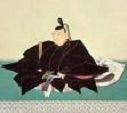




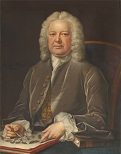

1716 In Feb. the British and Dutch sign a commercial treaty. In Feb. John Campbell, duke of Argyll (Argyle) disperses the Jacobite troops without a battle, and Old Pretender James III flees to France; the Jacobite leaders are impeached, and Dernwentwater and Kenmure are executed on Feb. 25. On Apr. 5 HRE Charles VI of Austria declares war on Turkey; on Aug. 5 Prince Eugene of Savoy (Savoy-Carignan) (1663-1736) defeats the Turks in the Battle of Peterwardein (Petrovaradin) in Serbia; in mid-Oct. the Banat capital of Temesvar, the last Turkish bastion in Hungary (taken in 1552) falls, after which in 1718 all the Jews are expelled as spies. In May the Septennial Act of 1715 prolongs Parliament's life from three to seven years to guard against possible Jacobite uprisings. In May John Law founds the Banque Generale Privee (Gen. Private Bank), the first bank in France, with royal banking decrees that the bank's notes can be used to pay taxes; in 1715 he moves to Paris and secures the patronage of the duke of Orleans. In June the Treaty of Westminster between England and Austria is a mutual defense pact. On Aug. 24 John Knox (b. ?) (not the preacher who died in 1572) is executed for treason in Perth, Scotland after uttering some famous last words. On Nov. 28 after entering the Great Northern War against Sweden following Peter the Great's 1709 defeat of Charles in the Ukraine, Holland negotiates a Second Triple Alliance against Sweden with England and France, and the Dutch sign it at The Hague next Jan. 4. Peter the Great visits Europe for the 2nd time. Shogun (since 1712) Iyetsugu (b. ?) dies, and Tokugawa Yoshimune (1684-1751) becomes shogun #8 of Japan (until 1745). Speaking of sinking treasure fleets? The Sinking Fund Act is passed by the British Parliament as a way to pay off the debt of the Bank of England. The first black slaves are brought to the Louisiana territory. An Englishman obtains a license to extract oil from sunflowers for use in the weaving and tanning industries. English porno publisher Edmund Curll falsely attaches poet Alexander Pope's name to a collection of poems, causing the latter to respond by pub. A Strange But True Relation How Edmund Curll Was Circumcised, claiming that he converted to Judaism to become rich, but was "too much circumcised, which by the levitical law, is worse than not being circumcized at all," causing them to "cast him forth from their synagogue, and he now remains a most piteous, woeful and miserable sight." China prohibits Christian religious teaching. In 1716 the province of Chianti in C Tuscany, Italy between Florence and Sienna becomes an official wine-producing region, defined as the area around the villages of Gaiole, Castellini, and Rada; in 1932 it is redrawn and divided into seven sub-areas, incl. Classico, Colli Aretini, Colli Fiorentini, Colline Pisane, Colli Senesi, Montalbano, and Rufina; they have been producing wine since the 14th cent; it is traditionally sold in a squat bottle in a straw basket (It. "fiasco"), with a black rooster (gallo nero) seal. Mineral waters are discovered in Cheltenham, England. The Royal Regiment of Artillery is founded in England. Diario di Roma, the first Italian newspaper begins pub. The Historical Register begins pub. (ends 1738). The Collegiate School of America (later Yale U.) relocates to New Haven, Conn. 10-y.-o. Benjamin Franklin leaves school to work in his father's candle and soap shop in Boston. The first co. of English actors is formed in Williamsburg, Va., opening the first theater in British Am. - Shakespeare's not welcome in New England? Poltergeist phenomena are reported in Epworth Old Rectory in Lincolnshire, England, home of Methodism founders John Wesley (1703-91) and Charles Wesley (1707-88). Architecture: On Sept. 14 the Boston Light on Little Brewster Island, Mass. in outer Boston Harbor begins operation, becoming the first lighthouse in the U.S.; on Nov. 3, 1718 lighthouse keeper George Worthylake (1673-1718) drowns along with his wife and daughter en route to the island; during the Am. Rev. the British capture and hold it, surviving two rebel attacks, who burn it each time, after which they withdraw in 1776 and blow it up, after which the lighthouse is rebuilt in 1783 to the original 75-ft. height, then raised to 98 ft. in 1856; it is automated in 1998. The Amber Room (Bernsteinzimmer), constructed in 1701-9 in Charlottenburg Palace, Prussia is given by Friedrich Wilhelm I to Tsar Peter the Great, becoming known as "the Eighth Wonder of the World". Baroque St. George's Church in S Bloomsbury, London, designed by architect Nicholas Hawksmoor (1661-1736) is begun (consecrated Jan. 28, 1730); his 6th and last London church; Victorian novelist Anthony Trollope is baptized there in 1824. Spain begins establishing Roman Catholic missions in East Tex., starting with Mission Senora de la Purisima Concepcion de los Ainais on the Angelina River, serving the Ainais tribe until the French threat causes them to close it and reopen it in 1721, then move it to Austin, Tex. in 1730 followed by San Antonio, Tex. in 1731 as Mission Nuestra Senora de la Purisima Concepcion de Acuna; in 1716 Mission San Jose de los Nazonis is established near modern-day Cushing, Tex., moving in 1730 to San Antonio as San Juan Capistrano; in 1716 Mission Nuestra Senora de Guadalupe de los Nacogdoches is established in East Tex. to serve the Nacogdoche tribe, later becoming the town of Nacogdoches, Tex.; in 1716-17 Mission San Miguel de Linares de los Adaes is established 20 mi. W of the French fort at Natchitoches, La. to serve the Adaes tribe; in 1717 Mission Nuestra Senora de los Dolores de los Ais is established near modern-day San Augustine, Tex. to serve the Ais tribe, moving to San Antonio in 1719; on May 1, 1718 Mission San Antonio de Valero is established on the San Antonio River by Father Antonio de Olivares and New Spain viceroy Marquis de Valero, becoming known as the Alamo in 1744. Science: After being brought in by brain babe Princess Caroline of Ansbach (wife of future George II), English philosopher-clergyman Samuel Clarke (1675-1729) begins the Leibniz-Clarke Correspondence with aging Gottfried Wilhelm von Leibniz (ends 1716), which incl. a famous debate on absolute vs. relative space, with Clarke on the absolute (Newton's) side, maintaining that space is not a substance but an attribute of a self-existent infinite spiritual supreme being - a galactic computer program inside God's mind? Edmund Halley pub. an account of nebulae. Cotton Mather describes the first plant hybridization, of Indian corn by yellow corn; he also predicts that the world will end this year - 17-16 = Matherian Fever? Music: Francois Couperin (1668-1733), L'Art de Toucher le Clavecin (The Art of Harpsichord Playing); suggestions for keyboard technique when playing his 4 vols. of harpsichord music (230 pieces) pub. in 1713, 1717, 1722, and 1730, which influence Johannes Brahms et al.; "The poet musicianp par excellence", who believed in "the ability of Music [with a capital M] to express itself in prose and poetry", and that "if we enter into the poetry of music we discover that it carries grace that is more beautiful than beauty itself." (Jordi Savali) Reinhard Keiser (1674-1739), Das Zerstorte Troja oder Der Durch den Tod Helenens Versohnte Achilles (opera) (Hamburg). Art: Sir James Thornhill (1675-1734), Ceiling of the Great Hall in Bleinheim Palace; shows the duke of Marlborough's V at the Battle of Blenheim. ?, Life of St. Paul (1716-9); eight grisaille scenes in the cupola of St. Paul's Cathedral. Jean-Antoine Watteau (1684-1721), La Lecon d'Amour. Nonfiction: The first ed. of the Kings James Bible is pub. in Ireland, becoming the Sin On Bible when the pop-up porno ad "sin on more" is printed for John 5:14 instead of "sin no more", and 8K copies are printed before the mistake is discovered. Richard Bradley (1688-1732), History of Succulent Plants (5 vols.) (1716-27). Sir Thomas Browne (1605-82), Christian Morals (posth.); "Tread softly and cirumspectly in this funambulatory Track and narrow Path of Goodness: Pursue Virtue virtuously: Leven not good Actions nor render Virtues disputable. Stain not fair Acts with foul Intentions: Maim not Uprightness by halting Concomitance." (opening) Benjamin Church (1642-) (with Thomas Church), Entertaining Passages Relating to Philip's War; puffs himself up, and creates the myth of the westward-pushing Am. frontiersman. Arai Hakuseki, Ori-Taku-Shiba (autobio.). Plays: Joseph Addison (1672-1719), The Drummer. Susanna Centlivre and Nicholas Rowe, The Cruel Gift (tragedy). Poetry: Christopher Bullock, The Cobbler of Preston; "'Tis impossible to be sure of anything but Death and Taxes." John Gay (1685-1732), Trivia - coins the word? ? da Silva (ed.), Fenix Renascida (anthology). Births: Spanish writer-astronomer and naval officer Antonio de Ulloa (d. 1795) on Jan. 12 in Seville; first Spanish gov. of La. (1766-8). Am. Rev. leader (DOI signer) (Presbyterian) (Freemason) Philip Livingston (d. 1778) on Jan. 15 in Albany, N.Y.; grandson of Robert Livingston (1654-1728); educated at Yale U.; founder of King's College (Columbia U.). French writer Jean-Jacques Barthelemy (d. 1795) on Jan. 20 in Cassis, Provence. Spanish Bourbon king #3 (1759-88), Sicilian king (1735-59), and duke of Parma (1732-5) Charles III (Don Carlos of Bourbon) (d. 1788) on Jan. 20 in Madrid; 2nd son of Philip V (1683-1746) and Elizabeth Farnese; half-brother of Ferdinand VI (1713-59); husband (1738-60) of Maria Amalia Christina of Saxony (1724-60); father of Ferdinand IV (1751-1825). English soldier-politician George Germain (Germaine), 1st Viscount Sackville (d. 1785) on Jan. 26; 3rd son of Lionel Cranfield Sackville (1688-1765); educated at Trinity College, Dublin. Am. architect (first prof. architect in Am.) Peter Harrison (d. 1775) on June 14 in York, England; emigrates to the R.I. in 1740. French "Chevaux de Marly" artist Guillaume Coustou the Younger (d. 1777) on Mar. 19; son of Guillaume Coustou the Elder (1677-1746); nephew of Nicolas Coustou (1658-1733). French Neoclassical painter (last French royal painter, 1789-91) Joseph-Marie Vien (Joseph-Mary Wien) (d. 1809) on June 18 in Montpellier; husband of Marie-Therese Reboul (1728-1805); teacher of Jacques-Louis David and Francois-Andre Vien. Scottish scury-curing physician James Lind (d. 1794) on Oct. 4 in Edinburgh. English "Father of the Colonies" George Montagu Dunk, 2nd Earl of Halifax (d. 1771) on Oct. 6; pres. of the Board of Trade and Plantations. French Rococo sculptor Etienne (Étienne) Maurice Falconet (d. 1791) on Dec. 1 in Paris; patronized by Madame de Pompadour. English "Elegy Written in a Country Churchyard" poet (bi?) Thomas Gray (d. 1771) on Dec. 26 in Cornhill, London; educated at Eton College and Peterhouse College, Cambridge U. French gov. of Guadeloupe (1763-4) maj.-gen. Francois-Charles de Bourlamaque (d. 1764) in Paris. English Bridgewater Canal engineer James Brindley (d. 1772) in Tunstead, Derbyshire. English writer Sir John Hill (d. 1775) in Peterborough. Am. Rev. leader (DOI signer) George Taylor (d. 1781) in Ireland. English landscape designer ("England's greatest gardener") Lancelot "Capability" Brown (d. 1783) in Kirkharle, Northumberland. Japanese haiku poet-painter Yosa (no) Buson (Taniguchi) (d. 1784) in Kema (Osaka), Setssu Province. Spanish gov. #1 of Alta calif. (1767-70) Gaspar de Portola (Portolà) i Rovira (d. 1786) in Os de Balaguer, Catalonia. French road engineer P.M.J. Tresaguet (Trésaguet) (d. 1794). Italian sculptor Bartolomeo Cavaceppi (d. 1799). Deaths: English politician Sir Stephen Fox (b. 1627) on Oct. 28. French painter Charles de la Fosse (b. 1636) on Dec. 13. French adm. Francois Louis de Rousselet, marquis de Chateaurenault (b. 1637) on Nov. 15 in Paris. English dramatist William Wycherley (b. 1640). German #1 philosopher-scientist-mathematician Gottfried Wilhelm von Leibniz (b. 1646) on Nov. 14 in Hanover; the English royalty snubs his funeral, even though George I is near Hanover at his death; never marries; his grave goes unmarked for 50+ years; there goes the last universal European thinker until TLW, nyuk nyuk nyuk - and the one voted most likely to be cloned? German naturalist Engelbert Kaempfer (b. 1651) on Nov. 2 in Lemgo. French musical theorist Joseph Sauveur (b. 1653). German elector Johann Wilhelm II (b. 1658) on June 8 in Dusseldorf. French mathematician Antoine Parent (b. 1666) on Sept. 26. English mathematician Roger Cotes (b. 1682) on June 5 in Cambridge.



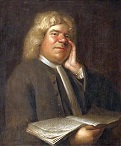




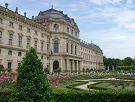

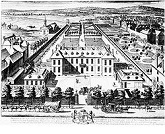


1717 The 4th and final mass migration from Britain to the New World begins as hundreds of thousands of Celtic Britons and Scotch-Irish from N Ireland, the Scottish lowlands and the N counties of England flock into the rugged back country along the Appalachian Mts. in Am., incl. 250K Ulstermen (ends 1775). On May 19 Peter the Great takes a crap at the Hotel des Invalides in Paris, and, there being no other paper, uses a 100 franc note to wipe his ass, leaving it to the valet, who freaks, until the concierge tells him, "When you wash it off, it will buy just as many drinks"; while in Paris, Peter sits for his portrait by painter French Rococo Jean-Baptiste Oudry (1686-1755). On May 27 the viceroyalty of New (Nueva) Granada is formed by the Bourbon kings from Nueva Granada (Bogota Plateau), Panama, Venezuela, and Quito (until 1739). On June 24 (feast of St. John the Baptist) the Premier (Mother) Grand Lodge (Orient) of England (London) (Westminster) is established in London at the Goose and Gridiron Ale House in St. Paul's Churchyard from the union of four London Craft lodges; Mother Kilwinning Lodge (Number 0) in Scotland claims to date from 1140; official Freemasonry is born, building men instead of churches; the trademark is the square and compass; the Masonic Tenets are Brotherly Love, Relief, and Truth; the three degress are entered apprentice, fellow craft, and master mason; there are three degrees, three candles, three knocks on the door, three stages of life, three principal numbers, all because Plato taught the Trinity (1+2=3); passwords: Boaz (1st degree), Jachin (2nd degree), Mahabyn (3rd degree); the first gift given to a Freemason is a white leather apron, which is buried with him at death; the York Rite has 10 higher degrees: four Royal Arch degrees, three Cryptic Mason degrees, three Chivalric orders, ending with the Knights Templar Order; in the early years a man with a sword guards the doors; non-Freemasons get suspicious that the Freemasons are using mind control on them, and found the Mad Hatter fraternity, wearing aluminum foil hats? In the summer wealthy Barbados landowner ("the Gentleman Pirate") Stede Bonnet (1688-1718) goes bad, buys the Revenge, and begins freebooting along the E coast of North Am., then hooks up with Blackbeard in Dec., ceding to his command before/after he fails to capture the Protestant Caesar; he becomes the only pirate who actually is known to make his victims walk the plank? On July 11 after Spain attacks Austria in Italy, the Triple Alliance (a different one than in 1668, an attempt to maintain the 1713 Treaty of Utrecht) is formed by Britain, France, and the Netherlands against Spain. On July 17 (7-17-1717) the Water Music, composed by Georg Friedrich (George Frideric) Handel (1685-1759), now in the service of the Duke of Carnarvon is used as the serenade to George I at a royal river picnic on the Thames River, where the king's barge is accompanied by "so great a Number of Boats, that the whole River in a manner was cover'd"; the barge next to the royal one carries 50 musicians playing Handel's composition 3x as they all travel 5 mi. upriver from Westminster to Chelsea. On Apr. 15 PM (since oct. 12, 1715) Robert Walpole resigns, and on Apr. 15 is succeeded by James Stanhope, 1st Earl Stanhope (1673-1721) as chief minister of the British cabinet (until Mar. 20, 1718), who tries to use a network of alliances to maintain the peace of Europe as well as the stability of Britain; for the first time the English cabinet is all Whig. Prince Eugene ejects the Turks from Belgrade. Old Pretender James III is forced to leave France. A separate Afghan state is formed under Abdalis of Herat. The Tibet Revolt (ends 1720) begins with the seizure of Lhasa by the Dzungar (Zunghar) Mongols under Tsewang Rabdan (1697-1727), nephew of W Mongol (Olot) chief Gladan. The Bahamas become an English crown colony (until 1964). Philippines gov. Fernando Manuel de Bustillo Bustamente y Rueda (-1719) "the Marsical" attempts to reform govt. finances, causing his murder by friars in 1719 - don't bust the mint? John Law's Mississippi Co. receives a monopoly of trade with Louisiana. Armenian Mekhitarist monks settle on the San Lazzaro Island in Venice. Dover, Del. is founded on 125 acres acquired by William Penn in 1683. The seaport of Krasnovodsk (Rus. "red water") (modern pop. 50K) on the Krasnovodsk Gulf in NW Turkmenistan across the Caspian Sea from Baku is founded as a fort; in 1993 it is renamed Turkmenbashi ("leader of all Turkmen") by pres. Saparmurat Niyazov. The value of a golden guinea is fixed at 21 shillings, equivalent to $20.67 a troy ounce (almost quadrupling since 1344); this price is maintained until 1934. The bang-bang-on-the-door-baby Bangorian Controversy begins when Bangor, Wales bishop Benjamin Hoadly (1676-1761) gives a hoadly sermon denying the doctrinal and disciplinary authority of the church; the king suspends the convocation (church legislative body) until 1852. By an act of the British Parliament, convicts guilty of certain crimes can escape the hangman by "transportation" to the colonies; most choose the Chesapeake - like Defoe's Moll Flanders? School attendance becomes compulsory in Prussia. Ft. Prince of Wales is built on the Hudson Bay at the mouth of the Churchill River by James Knight of the Hudson's Bay Co. The Spanish build a fort on the N shore of the La Plata estuary on the future site of Montevideo. William Pitt, gov. of Madras sells the Indian 136.9 carat Pitt (Regent) Diamond to Duke Philippe of Orleans. Bohemian-born Baroque architect Johann Balthasar Neumann (1687-1753) begins working for the Schonborn prince-bishop of Wurzburg, going on to turn the town into a showpiece, building the Wurzburg Residence, the Basilica of the Vierzehnheiligen (Fourteen Holy Helpers) (1743-72) et al. French actress Adrienne Lecouvreur (1692-1730) debuts at the Comedie Francaise in Paris in Prosper Jolyot de Crebillon's "Electre". J.S. Bach becomes kappelmeister in Kothen (Köthen) in Saxony-Anhalt (until 1723). Architecture: British army barracks are erected in Berwick-upon-Tweed, 2.5 mi. S of the Scottish border, designed by Nicholas Hawskmoor (1661-1736) (finished 1721). After returning from a Grand Tour of Italy in 1714, and before going on a 2nd one in 1719, Richard Boyle, 3rd Earl of Burlington (1694-1753) reads Giacomo Leoni's "Palladio", and is turned on, firing James Gibbs (hired in 1709 by his mother Lady Juliana) and hiring Colen Campbell to remodel Burlington House on Piccadilly Circus in Mayfair, London in strict Palladian style, which ends up housing five learned societies (the Courtyard Societies), incl. the Royal Astronomical Society, Society of Antiquaries of London, Linnean Society of London, Royal Society of Chemistry, and the Geological Society of London; by the 1730s the Palladian style is accepted as the std. for a British country house or public bldg., and Burlington becomes known as "the Apollo of the Arts" and "the Architect Earl". Inventions: On Dec. 31 the first written mention of the Conestoga Wagon, named after the Conestoga River and/or Township and/or Conestoga tribe in Lancaster, Penn., invented by German Mennonite immigrants, which becomes popular for use in the Great Appalachian Valley along the Great Wagon Road, and for commerce to Pittsburgh and Ohio; they prove too heavy for use on the Great Prairie, and ordinary farm wagons with canvas covers are used by pioneers. Edmund Halley invents the first practical diving bell, consisting of a wooden chamber with glass windows, supplied with air by movable exterior wooden air barrels fitted with leather tubes. Science: Lady Mary Wortley Montagu (1689-1762) introduces smallpox inoculation in England. The hybridization of Dianthus is reported in Britain by English gardener Thomas Fairchild (1667-1729) of Hoxton, East End, London, who crosses a Sweet William (Dianthus barbatus) with a Carnation Pink to create Fairchild's Mule, the first artificial hybrid. Music: J.S. Bach (1685-1750), Orgelbuchlein (46 organ chorales); Six Suites for Unaccompanied Cello (1717-23). G.F. Handel (1685-1759), Water Music (July 17); the Allegro is later used by William F. Buckley Jr. for "Firing Line". Reinhard Keiser (1674-1739), Der Grossmutige Tomyris (opera) (Hamburg); Jobates und Bellerophon (opera) (Hamburg). John Weaver (1673-1760), The Loves of Mars and Venus (ballet) (Drury Lane). Art: Jean Baptiste Oudry (1686-1755), Portrait of Tsar Peter the Great (Paris). Jean-Antoine Watteau (1684-1721), Embarkation for the Isle of Cythera. Nonfiction: Anon., The Vinegar Bible; ed. of the 1611 King James Bible that misprints the heading of Luke 20 as "The parable of the vinegar" instead of vineyard. Anthony Collins (1676-1729), A Philosophical Inquiry Concerning Human Liberty. August Hermann Francke, Praelectiones Hermeneuticae. Cardinal de Retz (1614-79), Memoires (Fronde period) (posth.). William Sutherland, Prices of the Shipbuilding Adjusted: or, the Mystery of Ship-Building Unveiled. Rev. John Wise, The Vindication of the Government of the New England Churches: "Government was never Established by God or Nature, to give one Man a Prerogative to insult over another." Plays: Prosper Jolyot de Crebillon (1674-1762), Semiramis; another flop, although his jealous rival Voltaire writes his own version later, like he does with four other of his tragedies ("Electre", "Catilina", "Le Triumviral", "Ahreeas"). Poetry: Thomas Parnell (1679-1718), Battle of the Frogs and Mice. Alexander Pope (1688-1744), Collected Works; incl. "Eloisa to Abelard", "Elegy to the Memory of an Unfortunate Lady", "Epistles to Martha Blount". Voltaire (1694-1778), La Henriade; in honor of Henry IV of France during the 1589 siege of Paris; written in the Bastille, then pub. in 1723. Births: Ottoman sultan #26 (1757-74) Mustafa III (d. 1774) (AKA Cihangir) on Jan. 28 (Jan. 18) in Constantinople; son of Ahmed III (1673-1736); brother of Abdulhamid I (1725-89); father of Selim III (1761-1808). English field marshal Baron Jeffrey (Jeffery) (Geoffrey) Amherst, 1st Baron Amherst of Montreal (d. 1797) on Jan. 29 in Brooks Place (Riverhead), Sevenoaks, Kent (near Sackville's Knole); born into a family of lawyers and clergymen; at age 12 becomes a page to Lionel Sackville, 7th earl and 1st duke of Dorset, rising to secy.; at age 18 becomes an ensign in the First Regiment of Foot Guards; leads British forces that win control of Wet-Dry Can Can Canada from France, becoming Britain's #3 all-time gen. after Marlborough and Wellington. Austrian field marshal Baron Ernst Gideon von Laudon (Loudon) (d. 1790) on Feb. 2 in Tootzen (Latvia). English 5'4" actor-playwright-impresario David Garrick (d. 1779) on Feb. 19 in Hereford; descendant of French Huguenots who settled in the 1680s; pupil-friend of Dr. Samuel Johnson (1709-84). Austrian archduchess (1740-80), Bohemian queen (1740-1), and HRE (1745-65) Maria Theresa Walburga Amalia Christina (d. 1780) on May 13 in Vienna; daughter of HRE Charles VI; empress of the German Holy Roman Empire, and mother of 16 children incl. HRE Joseph II and Marie Antoinette. Czech violinist-composer Johann Wenzel Anton Stamitz (Jan Vaclav Stamic) (d. 1757) on June 18 in Deutschbrod, Bohemia; father of Carl Stamitz (1745-1801) and Anton Stamitz (175-1809). French sculptor Jacques Francois Joseph Saly (d. 1776) on June 20 in Valenciennes. French chemist Joseph Marie Francois de Lassone (d. 1788) on July 3 in Carpentras (Vaucluse). Portuguese king (1777-86) Pedro III (d. 1786) on July 5 in Lisbon; younger son of John V and Mary Anne of Austria; brother of Joseph I; maternal grandson of HRE Leopold I. French military leader Louis Francois I de Bourbon, Prince of Conti (d. 1776) on Aug. 13 in Paris; son of Louis Armand II and Louise Elisabeth de Bourbon (granddaughter of Louis XIV). English "The Castle of Otranto" writer-statesman Horace (Horatio) Walpole, 4th Earl of Orford (d. 1797) on Sept. 24 in London; 3rd (youngest) son of Robert Walpole (1676-1745); educated at Eton College, and King's College, Cambridge U.; becomes 4th earl of Oxford in 1791 when his eldest brother's son dies; cousin of Lord Horatio Nelson (1758-1805); MP in 1741-68. Am. Rev. War maj. gen. John Armstrong Sr. (d. 1795) on Oct. 13 in Brookeborough, County Fermanagh, Ireland; father of John Armstrong Jr. (1758-1843) and James Armstrong (1748-1828). French Canadian explorer Louis-Joseph Gaultier de La Verendrye (Vérendrye) (d. 1761) on Nov. 9 in Ile aux Vaches, Quebec; youngest son of Pierre La Verendrye (1685-1749); brother of Francois de La Verendrye (1715-94). French philosopher-scientist-mathematician-encyclopedist (atheist) Jean Baptiste le Rond d'Alembert (d. 1783) on Nov. 16 in Paris; left by his mother at the steps of the Saint-Jean-le-Rond de Paris Church; educated at the U. of Paris; shacks up with babe Jeanne Julie Eleonore de Lespinasse (1732-76). German "History of Ancient Art" archaeologist and art historian (gay?) Johann Joachim Winckelmann (d. 1768) on Dec. 9 in Stendal, Brandenburg; son of a cobbler. French statesman-diplomat Charles Gravier, Comte de Vergennes (d. 1787) on Dec. 20 in Dijon. English Baptist hymnodist Anna Steele (d. 1778) in Broughton, Hampshire. Spanish gov. of Guatemala (1779-83) and viceroy of New Spain (1783-4) gen. Matias de Galvez (Gálvez) y Gallardo (d. 1784) in Macharaviaya; father of Bernardo Galvez y Madrid (1746-86). English brewer William Bass Jr. (d. 1787); son of William Bass Sr. (-1732); father of William Bass III and Michael Thomas Bass (1760-1827). Welsh hymnodist William Williams Panycelyn (d. 1791) in Cefn-coed Llanfair ar y bryn Llandovery. Italian fencing master Domenico Angelo (Angelo Domenico Malevolti) (d. 1802) in Leghorn. English Bluestocking writer Elizabeth Carter (d. 1806). Deaths: French gov. of New France (1661-7) Pierre Boucher de Boucherville (b. 1622) on Apr. 19 in Boucherville (near Montreal), Canada. French mathematician Jacques Ozanam (b. 1640) on Apr. 3. German scientific illustrator Maria Sibylla Merian (b. 1647) on Jan. 13 in Amsterdam, Netherlands. French Quietist leader Madame Guyon (b. 1648) on June 9: "It is the fire of suffering that brings forth the gold of godliness." African Ashanti king (1675-1717) Osei Kofi Tutu I (b. 1660). German anatomist Frederick Ruysch (b. 1665). English coke smelting inventor Abraham Darby Sr. (b. 1678) on Mar. 8 in Madeley, Shropshire.




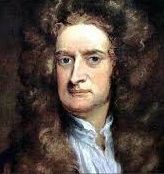


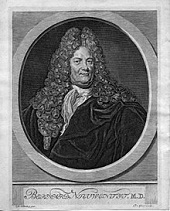
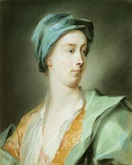


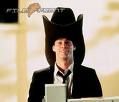

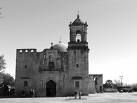



1718 The mass emigration of Protestants from Ulster to the New World begins. On Jan. 6 English sea capt. Woodes Rogers (1679-1732) (who rescued Alexander Selkirk in 1709) is appointed as royal gov. #1 of the new British crown colony (until 1973) of the Bahamas by George I (until June 1721), going on to clear the area of pirates, offering the "King's Pardon" to all but the worst and the leaders; in the summer Stede Bonnet is pardoned by N.C. gov. Charles Eden, and given a license to take Spanish ships, but he decides to go pirate again under the alias Capt. Thomas of the Royal James, then is chased by Col. William Rhett under the authorization of S.C. gov. Robert Johnson, and is captured on the Rhett River in early Oct. after all his ships run aground, and hanged in Charleston on Dec. 10; meanwhile on Nov. 22 6' English buccaneer Blackbeard the Pirate (Edward Teach or Thatch) (b. 1680), known for having 14 wives, carrying 12 pistols along with knives and swords, and tying slow-burning fuses to his heavy black beard and long braided hair dies at the Battle of Ocracoke Inlet fighting his former employees in his 300-ton 40-gun ship Queen Anne's Revenge (formerly Concorde, which he captured last Nov. and added 14 guns to), which sinks; his head is hung from the mast of his enemy's ship; in Oct. 2006 archeologists find his ship off the N.C. coast. On Mar. 25 the Danes claim the island of St. John in the Virgin Islands and found the Cinnamon Bay Plantation. In Mar. Charles Spencer, 3rd Earl of Sunderland (1674-1722) (whose portrait bears a striking resemblance to Sir Isaac Newton (1643-1727)?), known for his private library in Althorp (the finest in Europe in 1703, later moved to Blenheim Palace) replaces James Stanhope as chief minister of the British cabinet (until 1721), spending his time trying to get the number of members of the House of Lords limited. In Apr. 24-y.-o. Francois-Marie Arouet is released from the Bastille, and changes his name to the cool Voltaire (1694-1778), becoming the coolest "you can't touch this" literary wit of the cent.? On May 1 Mission San Antonio de Valero is established on the San Antonio River by Father Antonio de Olivares and New Spain viceroy Marquis de Valero as the first of a mission chain for Christianizing Indians, becoming known as the Alamo in 1744; on May 5 Gov. Martin Alarcon founds Villa de Bejar 3/4 league upstream at the headwaters of San Pedro Creek, which becomes the capital of the New Spain province of Tejas, the northernmost settlement in the Valley of Mexico; the mission is abandoned in 1793, becoming a military depot and fortress until 1836, when it becomes the Alamo, "Cradle of Texas Liberty". Pass around the wits, Sophocles? On July 21 the Treaty of Passarowitz (Pozarevac) between Turkey, Venice, and Austria ends the Seventh Ottoman-Venetian War (begun 1714); Banat, Lesser Walachia, and N Serbia, incl. Belgrade are lost by the Ottomans to the Hapsburgs of Austria, halting their westward expansion; too bad, Turkey is given full possession of Greece, and they partition it into districts ruled by autocratic govs. who oppress Greek Christians, causing klepht guerrillas to take to the mountains and Greek pirates to hold out on the Aegean while an underground Greek independence movement looks to Russia for aid; meanwhile Ibrahim becomes Ahmed III's chief advisor, and encourages the spread of learning and libraries, and the promotion of Greek Phanariots (PHanariotes) (residents of Phanar, the Greek quarter of Constantinople) to high places. On Aug. 2 the Quadruple Alliance of France, England, Holland, and the HRE (Austria) against Spanish ambitions in Italy is formed to maintain the Treaty of Utrecht, guarantee the succession of the reigning families of England and France, and settle the partition of the Spanish monarchy; Holland actually joins next year, but it's called the you know what, so? In the fall Charles XII of Sweden (b. 1682) goes to war against the Norwegians, and dies on Nov. 30 of a gunshot wound to the head during the Battle of Fredriksten (Fredrikshald) in Norway; he is succeeded on Dec. 5 by his sister Ulrika Eleonora the Younger (1688-1741) (until Feb. 29, 1720). In Nov. Alexis, only son of Peter I the Great of Russia is murdered at his orders. Pierre Sidrac Dugue (Dugué) dit Laf, Sieur de Boisbriant (Boisbriand) (1675-1740) is appointed as the first cmdr. of Ill. by the French. The Spanish reestablish Ft. Zamboanga (Pilar) in Mindanao (abandoned 1663), causing the Muslim kingdoms to renew hostilities. The Potawatomi relocate from Green Bay to Detroit. Lady Mary Wortley Montagu uses inoculation against smallpox in Turkey. Houessou Akaba (ruled since 1685) dies of smallpox, and his brother Dossou Agadja (Agaja) (-1740) usurps the throne from Akaba's 10-y.-o. son Agbo Sassa, and becomes king #5 of Dahomey in W Africa (until 1740), going on to get his butt kicked by the Yorubas and end up with his kingdom paying the king of Oyo an annual tribute of human slaves for the next cent., but making up for it by conquering the Savi city of Ouidah in 1724 using his Dahomey Amazon nude bodyguards as warriors, giving Dahomey direct access to the sea and the lucrative slave trade; starting next year the majority of African slaves brought to La. (until 1731) come from Benin, bringing La. Voodoo with them. The French begin moving N of Cape Charles to fish - and after that they really want to talk? Jean-Baptiste Le Moyne, Sieur de Bienville and the Mississippi Co. of Perth Amboy (founded 1685) found the city of New Orleans ("the Crescent City") on a bend in the Mississippi in honor of the duke of Orleans (regent of France), becoming one of the first planned towns in North Am.. Fort de Chartres is built by the French N of Kaskasia, Ill. 12-y.-o. Benjamin Franklin is apprenticed to his printer brother James for nine years. Nicholas Rowe (b. 1674) dies, and Laurence Eusden (1688-1730) becomes poet laureate of England (until Sept. 27, 1730). G.F. Handel succeeds John Christopher Pepusch as kappellmeister to the duke of Chandos. The Leeds Mercury newspaper begins pub. The first bank notes are issued in England. Porcelain begins to be manufactured in Vienna. Wool export is forbidden by the British govt. French Jesuit missionary Joseph-Francois Lafitau (1681-1746), who arrived in Canada in 1711 and lived with the Iroquois pub. his discovery of ginseng in Canada, causing a gold rush fever and big profits; the first shipment of ginseng from Canada arrives in Canton, China; too bad, they overproduce it and dry it too fast, creating inferior stuff, ruining their own trade. The word "cicisbeo" (arranged lover of a married woman) is first used in a letter by Lady Mary Wortley Montagu; Lord Byron later acts as cicisbeo to Contessa Teresa Gamba Guiccioli, and writes "You must understand, this Italian fashion prevails at Nice among all ranks of people; and there is not such a passion as jealousy known. The husband and the cicisbeo live together as sworn brothers; and the wife and the mistress embrace each other with marks of the warmest affection." The London Society of Antiquaries is founded. The Accademia dei Scienze, Lettere, ed Arti is founded in Palermo. Yale College is named after prominent Anglican Conn. diamond merchant and slave trader (in Madras, India) Elihu Yale (1649-1721) after Calvinist minister Cotton Mather convinces him to give it an endowment of nine bales (£562 worth) of goods along with 417 books and a portrait of George I to counter the liberal and irreligious trends at Harvard "to serve the great interests of education and so of religion"; Yale's money to fund the college was stolen from the East India Trading Co., when he was pres. of Madras until being removed in 1692 after charges of corruption?; actually, Jeremiah Dummer Jr. (1681-1739) (first colonial-born Am. to earn a Euro Ph.D.) is the real founder, soliciting donations from Yale, as well as Isaac Newton and Richard Steele, but nobody wants to go to Dumb and Dummer College, so they stage a coverup? The first Free Masonic Hell Fire (Hellfire) Club is founded by Jacobite politician Philip, 1st Duke of Wharton (1698-1731) et al. in London, England, expanding to several clubs run by the notorious Sir Francis Dashwood et al., whose members (incl. Benjamin Franklin?) engage in sexual orgies and call themselves "Friars of St. Francis of Wycombe"; in 1721 they are closed by royal edict, and some reopen later under less obvious names in 1749-60/66? - like massage parlors? Architecture: Inventions: English weaver Sir Thomas Lombe (1685-1739) patents a machine to make thrown silk, then builds a silk mill in Derby, pissing off the Italians, from whom he had stolen the design (used since the early 1600s), who send a hit woman, who poisons his brother and partner John Lombe in 1722, but doesn't stop him from breaking the Italian monopoly on silk trade and lowering the price, even getting knighted. Science: French chemist Etienne Francois Geoffroy (1672-1731) presents his tables of chemical affinities to the French Academie. Nonfiction: William Fleetwood (1656-1723), The Justice of Paying Debts. Thomas Foxcroft (1697-1769), A Practical Discourse Relating to the Gospel Ministry; new Harvard-educated Puritan preacher blasts his Boston congregation with shocking language in order to "breathe heavenly fire to melt and enliven... dead affections". Etienne Geoffroy (1672-1731), Tables of Affinity; chemical reactivity data recording the order in which acids will expel weaker ones from combination with bases. Abraham de Moivre (1667-1754), The Doctrine of Chances; first textbook on probability theory; prized by gamblers; De Moivre's Formula is later named after him. Cornelius Nary (1658-1738), Catholic English Version of the New Testament; first complete English trans. after the Rheims trans., by a parish priest from Dublin. Bernard Nieuwentyt (1654-1618), The Religious Philosopher: or, The Right Use of the Contemplation of the World, for the Conviction of Atheists and Infidels (2 vols.); basis of William Paley's "Natural Theology" (1802). Philibert-Joseph Le Roux, Dictionnaire Comique, Satrique, Critique, Burlesque, Libre, et Proverbial (1718-86). Art: Peter Cooper, The Southeast Prospect of the City of Philadelphia; long horizontal painting which becomes the oldest painting of a North Am. urban center to survive to modern times. Giambattista Foggini (1652-1725), Bust of Cosimo III de' Medici (1642-1723) (1717-18) (marble sculpture). Sir Godfrey Kneller (1646-1723), Portrait of the Duke of Norfolk. Balthasar Permoser (1651-1732), Apotheosis of Prince Eugene of Savoy (1718-21) (sculpture); portrays him as Hercules towering over a fallen Turk along with the figure of Fame, but the prince doesn't like it because it's too Baroque and not classical enough? Sebastiano Ricci, The Dream of Aesculapius. Jean Antoine Watteau, Mezzetin; Parc Fete. Music: G.F. Handel (1685-1759), Acis and Galatea (HWV 49) (masque); libretto by John Gay (1685-1732), John Hughes, and Alexander Pope (1688-1744), based on John Dryden's 1717 trans. of Ovid's "Story of Acis, Polyphemus and Galatea"; his most performed work during his lifetime. Plays: Susanna Centlivre (1667-1723), A Bold Stroke for a Wife (satire) (Lincoln's Inn Fields, London) (Feb. 3) (6 perf.); big hit in the U.S.; debuts on Broadway at Wallack's Theatre in 1863; Col. Fainwell and Anne Lovely are in love, but he must court her in disguse to get around her four guardians, and goes too far when he impersonates Quaker Simon Pure, who has to fight an identity thief; a satire of the Tories, religious hypocrisy, and capitalism, supporting the Whigs; causes the term "simon-pure" to be coined for untainted. Colley Cibber (1671-1757), The Non-Juror (comedy). Voltaire (1694-1778), Edipe (tragedy); about Oedipus; his first play, written in the Bastille, which becomes a hit, launching his career. Births: Am. Rev. War Maj. Gen. Israel "Old Put" Putnam (d. 1790) on Jan. 7 in Salem (Danvers), Mass.; ranking officer at the 1775 Battle of Bunker Hill; born to a farming family associated with the Salem Witch Trials; moves to Mortlake (Pomfret), Conn. at age 22. English adm. Georges Brydges Rodney, 1st Baron Rodney (d. 1792) on Feb. 13 in Walton-on-Thames; created baron in 1782. French Jesuit Oriental scholar Jean Joseph Maria Amiot (d. 1793) in Feb. in Toulon; Jesuit missionary in China from 1750-93. Scottish prof. of rhetoric Hugh Blair (d. 1800) on Apr. 7 in Edinburgh. U.S. Navy Commodore (Navy CIC in the Am. Rev. War.) Esek (Essex) Hopkins (d. 1802) on Apr. 26 in Scituate, R.H.; brother of Stephen Hopkins (1707-85); first CIC of the U.S. Navy and first ranking officer. Am. nonconformist Glasite theologian Robert Sanderman (d. 1771) on Apr. 29 in Perth, Scotland; educated at Edinburgh U.; emigrates to Danbury, Conn. in 1763. Swiss astronomer Jean-Philippe Loys de Cheseaux (Chéseaux) (d. 1751) on May 4 in Lausanne. Italian mathematician-philosopher ("the Witch of Agnesi") Maria Gaetana Agnesi (d. 1799) on May 16 in Milan; educated at the U. of Bologna. English cabinetmaker Thomas Chippendale (d. 1779) on June 16 (June 5 Old Style) in Otley (near Leeds); known for "Gothick" tracery on chair backs. Dutch field marshal (1750-66) Louis Ernest of Brunswick-Luneburg (Brunswick-Lüneburg-Bevern) (d. 1788) on Sept. 25 in Wolfenbuttel; brother of Duke Charles I of Brunswick-Wolfenbuttel (1713-80). English socialite Elizabeth (Fidget) Montagu (d. 1800) on Oct. 2 in Yorkshire; invents the highbrow blue-stocking parties. French marshal Victor Francois de Broglie, 2nd Duc de Broglie (d. 1804) on Oct. 19 in Paris; father of Victor de Broglie (1756-94) and Victor de Broglie, 3rd duc de Broglie (1785-1870). British lord of the admiralty John Montagu, 4th Earl of Sandwich (OE "sandy place") (d. 1792) on Nov. 13 (Nov. 3 Old Style); educated at Eton and Trinity College, Cambridge U.; namesake of the Sandwich. French astronomer (discoverer of the Ring Nebula) Antoine Darquier de Pellepoix (d. 1802) on Nov. 23 in Toulouse. Deaths: English Utilitarian philosopher Richard Cumberland (b. 1631). Chinese Catholic priest and painter Wu Yushan (b. 1632). French mathematician-astronomer Philippe de La Hire (b. 1640) on Apr. 21. English Quaker Oats cover boy William Penn (b. 1644) on July 30 in Berkshire. Dutch theologian-mathematician Bernard Nieuwentyt (b. 1654) on May 30 in Purmerend, North Holland. English/Scottish queen Mary of Modena (b. 1658) on May 7 in Paris. French-born English dramatist Peter Anthony Motteux (b. 1663) on Feb. 18; dies in a brothel (autoerotic asphyxiation?). English celeb Charlotte Lee, Countess of Lichfield (b. 1664) on Feb. 17. English poet laureat and dramatist Nicholas Rowe (b. 1674). Dutch scholar Adriaan Reland (b. 1676) on Feb. 5 in Utrecht (smallpox). Anglo-Irish poet-clergyman Thomas Parnell (b. 1679) on Oct. 24. English lusty arrrgh pirate Blackbeard (Edward Teach) (b. 1680) on Nov. 22 in Ocracoke, N.C. (KIA). his head is displayed on a pole in Va. Swedish king (1697-1718) Charles XII (b. 1682) on Nov. 30 in Fredrikshald, Norway.








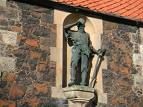

1719 On Jan. 23 HRE Charles VI declares the fiefs of Vaduz and Schellenberg united as a principality (Furstentum) under the name Liechtenstein; the princes of Lichtenstein don't visit it until Prince Aloys in 1818. On Feb. 8 England and France declare war on Spain. On Feb. 28 Farrukhsiyar (b. 1685) dies, and Syed Brothers puppet Rafi-ul Darjat (b. 1699) becomes Mughal emperor #10, dying on June 11 after having his brother Shah Jahan II (Rafi-ud-Daulah) (b. 1696) enthroned as Mughal emperor #11; on Sept. 19 he dies of lung cancer, and is succeeded by Bahadur Shah I's 4th son Muhammad (Mohammed) Shah (Roshan Akhtar) (Rangeela) (Joy-Maker) (1702-48) as Mughal emperor #12 (until Apr. 26, 1748), who goes on to kill the Syed Brothers in 1722 and become the last capable Mughal emperor, making Urdu the official court language, getting the Quran trans. for the first time into Persian, and replacing the Tartar dress with the long coatlike Sherwani. On Mar. 29 James Berkeley, 3rd Earl of Berkeley (1680-1736), cmdr. of the Dorsetshire becomes English lord high adm. (until Aug. 2, 1727), the first not of royal blood (until ?). On Sept. 18 Spain recaptures Pensacola, Fla. On Nov. 11 New Spain (Mexico) sets up the Tribunal de la Acordada (Court of Agreement) for quick justice to bandits, convicting 57.5K of 62,8250 accused by 1810, of which 888 are hung. In Nov. the Peace (Treaty) of Stockholm is signed between Sweden and Hanover, with Sweden ceding Bremen and Verdun to George I (elector of Hanover) for 1M rix dollars. On Dec. 5 after a short war between Spain and the Quadruple Alliance which comes close to making Spain the common enemy of all of Europe, Philip V of Spain dismisses Cardinal Giulio Alberoni, who retires to Rome. The Jacobites stage the Little Rising, and are defeated at the Battle of Glenshiel; Ireland is declared inseparable from England; speaking of mashed potatoes, Irish immigrants bring the potato to Londonderry, New Hampshire, and begin the first large-scale potato growing in North Am. The Jesuits are expelled from Russia. N Carolina and S Carolina become royal colonies after disputes over Yamassee land cause the Board of Trade to intervene (ends 1729). The city of Baton Rouge (Fr. "red stick") on the E bank of the Mississippi River in La. is founded. French settlers move into St. Vincent Island, cultivating coffee, tobacco, indigo, cotton and sugar using African slaves and Black Caribs. Cuyaba (Cuiaba) on the Cuiaba River (chief tributary of the Paraguay River) in Brazil is founded by prospectors from Sao Paulo who find gold and diamonds, becoming the capital of the inland state of Matto Grosso. The Church of the Brethren (Dunkers) (Dunkards), composed of Baptists opposed to military service and the taking of oaths migrates to Germantown, Penn. G.F. Handel becomes dir. of the Royal Academy of Music in London. Nouveau riche Alexander Pope moves to a villa in a watered grotto in Twickenham, which he lavishly decorates. Alessandro Scarlatti leaves Naples after his popularity fades, and settles in Rome (until 1723). The English Parliament repeals the Occasional Conformity Act and the Schism Act. The Banque General of John Law absorbs the rival East India and China Co., becoming the Banque Royale, with its notes guaranteed by the king, and a charter to manage the mint for nine years, and farm the nat. revenues while acting as receiver of the govt. debt, with Law becoming councilor of state and comptroller gen.; meanwhile his Mississippi scheme attracts speculators, who drive the shares sky high while his bank floods the country with paper money. The Oriental Co. is founded in Vienna; their 2nd try; lasts 25 years (until 1744). Westminster Hospital in Broad Sanctuary, London is founded after a meeting in a coffeehouse by four men to discuss a "charitable proposal for relieving the sick". Smoking is prohibited in France, except in Franche-Comte, Flanders, and Alsace. Scottish Presbyterian minister and Englightenment philosopher Francis Hutcheson (1694-1746) opens a private academy in Dublin, churning out a bunch of works on philosophical ethics that capture the British market until John Locke; afterwards (1729) he becomes a prof. of moral philosophy at Glasgow until death. Welsh-born Bartholomew Roberts (1682-1722), a third mate on a slave ship is captured by pirates off the coast of Africa, and ends up joining then rising to comand them, becoming known as Black Bart, and going on to capture some of the greatest prizes ever (until 1722). The Boston Gazette is founded by William Brooker after he becomes postmaster of Boston, Mass. (until 1720). The Am. Weekly Mercury begins pub. in Philly, becoming the first newspaper in the middle colonies, and 4th in North Am. Sports: The first Cricket Match pits the Londoners against the Kentish Men. James Figg (1695-1734) becomes England's first bare-knuckled boxing champ (until 1729), founding the modern art of boxing - I'm gonna knock your fig off? Architecture: Inventions: Antoine de Reaumur proposes using wood to make paper. German Baroque painter Jakob Christof Le Blon (1667-1741) invents color printing. Nonfiction: Dimitrie Cantemir (1673-1723), Treatise on Turkish Music; Chronicle of the Durability of Romanians, Moldavians and Wallachians (1719-22). Baron Christian von Wolff (1679-1754), Rational Thoughts About God, the World, and the Soul of Man, and on All Things Whatsoever. Music: G.F. Handel (1685-1759), 12 Chandos Anthems; for his patron James Brydges, 1st duke of Chandos. Isaac Watts (1674-1748), The Psalms of David: Imitated in the Language of the New Testament, and Applied to the Christian State and Worship, paraphrases in Christian verse the entire book of Psalms except for 12 he didn't think appropriate; incl. Joy to the World, which becomes the most popular Christmas hymn in North Am., Bless, O My Soul! The Living God, Jesus Shall Reign, My Shepherd Will Supply My Need, Our God, Our Help in Ages Past, This is the Day the Lord Hath Made, and 'Tis by Thy Strength the Mountains Stand; Watts' hymns go on to become popular with Lutherans, Presbyterians, Methodists, Baptists, Mormons, and Christian Scientists. Poetry: Ludvig Holberg (1684-1754), Pedar Paars (1719-20); mock-heroic epic poem satirizing contemporary manners. Plays: Thomas D'Urfey (1653-1723), Wit and Mirth, or Pills to Purge Melancholy. Edward Young (1683-1765), Busiris (Drury Lane, London). Novels: Daniel Defoe (1659-1731), The Life and Strange Surprising Adventures of Robinson Crusoe (Apr. 25); the first English novel?; based on the life of Scottish sailor Alexander Selkirk (1676-1721); spends 24 years on a desert island, where he is saved from cannibals by Friday on guess what day, and makes an umbrella out of skins; how white Euros can achieve salvation via work, the conquering of loneliness, and recognition of the inequality of human relations; "The aptest treatise on natural education" (Jean-Jacques Rousseau). Births: Am. Congregationalist Christian Socialist minister Joseph Bellamy (d. 1790) on Feb. 20 in Cheshire, Conn.; educated at Yale U.; student of Jonathan Edwards; great-grandfather of Edward Bellamy (1850-98) and Francis Bellamy (1855-1931). German poet Johann Wilhelm Ludwig Gleim (d. 1803) on Apr. 2 in Ermsleben (near Halberstadt), Ostharz. Swedish statesman-gen. Count Fredrik Axel von Fersen the Elder (d. 1794) on Apr. 5; son of Lt. Gen. Hans Reinhold von Fersen; father of Axel von Fersen the Younger (1755-1810). French diplomat-statesman-gen. Etienne Francois, Duc de Choiseul, Comte de Stainville (d. 1785) on June 28 in Nancy; eldest son of Joseph Francois de Choiseul, Marquis de Stainville (1700-70); cousin of Cesar Gabriel de Choiseul, duc de Praslin (1712-85). French "Philosophie sans le Savoir" dramatist Michel-Jean Sedaine (d. 1797) on July 4 in Paris. German geologist Johann Gottlob Lehmann (b. 1719) on Aug. 4 in Langenhennersdorf, Saxony; educated at the U. of Wittenberg. French marshal Francois-Gaston de Levis (Lévis), Duc de Levis (Lévis) (d. 1787) on Aug. 20 in Chateau d'Ajac (near Limoux). Austrian violinist-composer Johann Georg Leopold Mozart (d. 1787) on Nov. 14 in Augsburg, Germany; father of "miracle of God" Wolfgang Amadeus Mozart (1756-91). Irish actor Spranger Barry (d. 1777) on Nov. 23. English philosopher George Campbell (d. 1796) on Dec. 25. French critic Elie Catherine Freron (Élie-Catherine Fréron) (d. 1776) in Quimper, Brittany; educated by Jesuits. Irish elocutionist actor-lexicographer Thomas Sheridan (d. 1788); godson of Jonathan Swift; educated at Trinity College, Dublin; husband of Frances Chamberlaine Sheridan (1724-66); father of dramatist Richard Brinsley Sheridan (1751-1816). Am. educator (founder of Phillips Exeter Academy) John Phillips (d. 1795); uncle of Samuel Phillips Jr. (1752-1802). Irish writer (deaf) Charles Johnstone (d. 1800). Am. Rev. leader (DOI signer) James Smith (d. 1806) in Dublin, Ireland; emigrates to Penn. at age 10-12. Deaths: French mistress Marquise Francoise de Maintenon (b. 1635) on Apt. 15 in Saint-Cyr. Dutch painter Jan Weenix (b. 1640). English royal astronomer John Flamsteed (b. 1646) on Dec. 31 in Burstow, Surrey. English banker Sir Richard Hoare (b. 1648) on Jan. 6 in Hendon. Catholic educator St. John Baptist de la Salle (b. 1651) on Apr. 7 in Saint-Yon, Rouen, Normandy: "To touch the hearts of your pupils is the greatest miracle you can perform." French mathematician Michel Rolle (b. 1652) on Nov. 8 in Paris. French ecclesiastical historian Louis Elias Dupin (b. 1657). English poet Samuel Garth (b. 1661) on Jan. 18 in London. English writer-clergyman John Harris (b. 1666) on Sept. 7. French-Canadian explorer Jean Baptist Bissot, sieur de Vincennes (b. 1668) in Kekionga. English celebrated poet-essayist-dramatist Joseph Addison (b. 1672) on June 17 in Holland House, London; buried in Westminster Abbey; last words "See in what peace a Christian can die": "We are always doing, says he, something for posterity, but I would fain see posterity do something for us"; "A man must be both stupid and uncharitable who believes there is no virtue or truth but on his own side"; "There are three sides to every story: your side, my side, and the right side"; "The grand essentials for happiness in this life are something to do, something to love, and something to hope for"; "Admiration is a very short-lived passion, that immediately decays upon growing familiar with its object"; "Beauty soon grows familiar to the lover,/ Fades in his eye, and palls upon the senses." English banker Henry Hoare (b. 1677). French mathematician Pierre de Montmort (b. 1678) on Oct. 7. French garden designer Jean-Baptiste Alexandre Le Blond (b. 1679) on Mar. 10 in St. Petersburg (smallpox); the tsar attends his funeral; buried at St. Sampson Cemetery. German Dresden china inventor Johann Friedrich Bottiger (b. 1682).